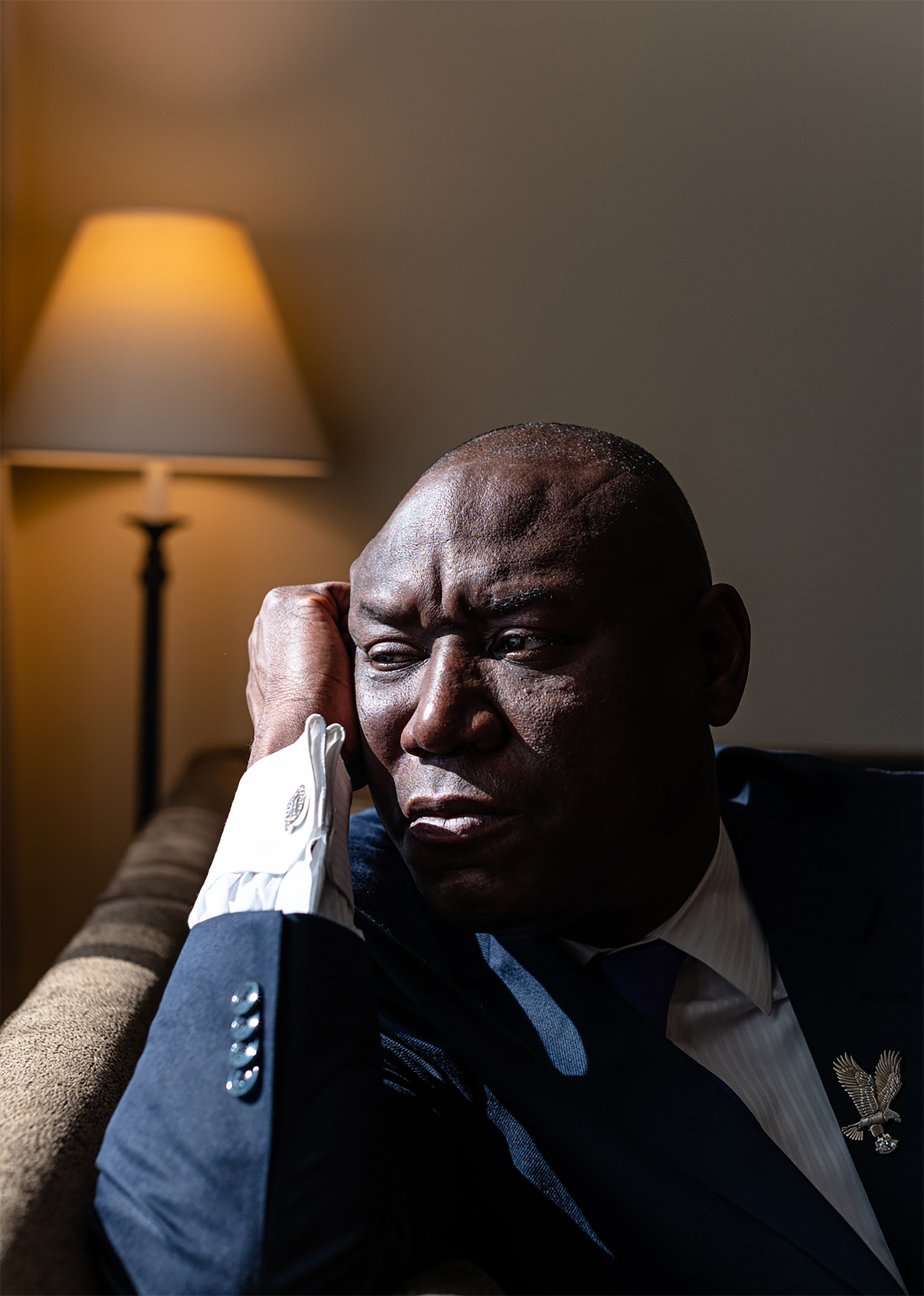Ben Crump is on the phone.
No. Ben Crump, 51, is on the phone—while also reading email, looking at texts and intermittently contributing to a hushed conversation happening in the room above the sanctuary at Minneapolis’ Greater Friendship Missionary Baptist Church. In the center of the room, most wearing face masks emblazoned with references to George Floyd, men in dark suits stand in a tight cluster: Floyd’s younger brother Philonise Floyd; the Rev. Al Sharpton, head jutted toward the ceiling, chest out, as if there’s a chart of what’s being discussed up above; Crump’s white co-counsel, the Chicago-based lawyer Antonio “Tony” Romanucci. It’s a makeshift war room where, instead of a tabletop map and a wreath of smoke, there’s a collection of Djembe and Talking drums in one corner and a cross above the door.
It’s the night before the trial of Derek Chauvin, the former police officer charged with killing Floyd. And the church, which occupies a block of 38th Street a five-minute drive from the spot where Floyd died, is hosting a prayer vigil for the Floyd family, which is about to experience a trial of its own. In the courtroom, the video of Floyd’s final moments will be played again and again; defense attorneys will emphasize the substances in his system when he died; the enduring stereotypes about the superhuman strength and danger represented by Black men will be on display. As Crump tells the men, they can expect that everyone and everything in the vicinity of the patch of ground where Floyd died will be blamed—except Chauvin. Things will get so ugly that George Floyd and others will be called “everything but a child of God,” Crump says.
The reasons are a matter of the unwavering math of American justice. To convict Chauvin, prosecutors would need to persuade all 12 members of the jury. To acquit, Chauvin’s defense would need simply to plant the seed of doubt.
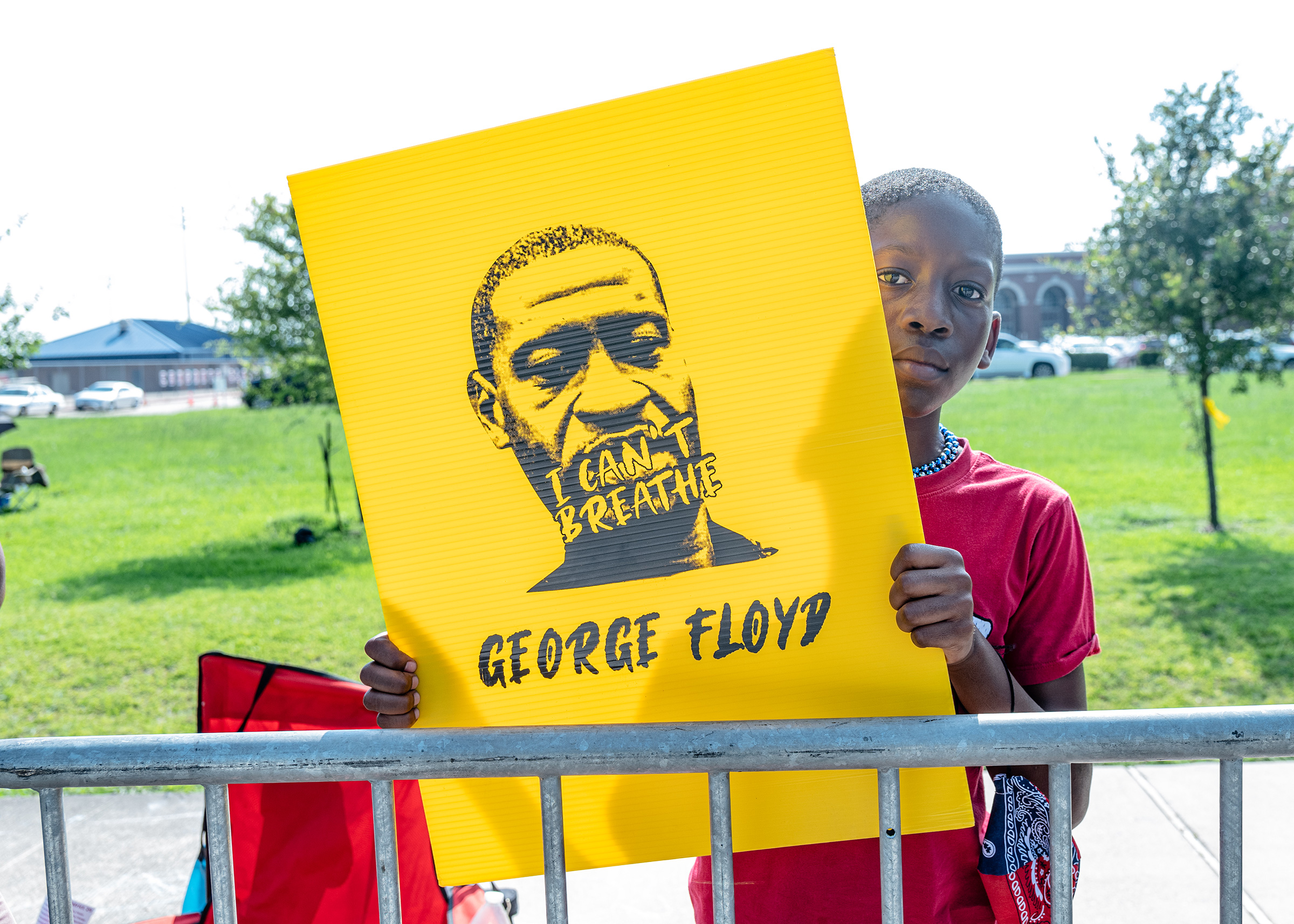
More than a month later, with the trial behind the country, its outcome—Chauvin becoming Minnesota’s first white cop found guilty of murder for killing a Black person while on duty—may seem to have been a foregone conclusion. This was the case with an up-close and gruesome video of the crime, from multiple angles and sources, from the beginning to the brutal end. How could anyone not be convinced? But those elements have been there before and, when filtering them through the dynamics of race and policing, American juries have time and again chosen not to convict. That’s why Floyd’s supporters, even those who somehow held faith that a conviction was possible, gathered at this church. And that’s why Ben Crump was there.
Many Americans first encountered Crump as the lawyer, adviser and crowd-clearer for the grief-stricken parents of Trayvon Martin, the 17-year-old Black boy killed by a neighbor as he walked to the home of his father’s girlfriend in 2012. In the years since, Crump, a state-college-educated attorney with no establishment connections, has become one of the best-known lawyers in the United States. His facility for navigating the media’s fickle interest in the evidence of American racism has grown, his suits have become more impeccably tailored and his security detail necessary. Crump also acts as legal interpreter, mental- and spiritual-health counselor, logistics wrangler, spokesman and litigator, legislative advocate and, of late, a negotiator of the single largest wrongful-death case involving a Black victim and a white police officer in U.S. history: On March 12, Minneapolis settled with Floyd’s family for $27 million.
Now, with Chauvin’s conviction, Crump has become the lawyer most closely associated with whether the era has finally arrived when there are limits to what a police officer can do to a Black person. Though he played no formal role in Chauvin’s criminal trial, he occupies a unique place in this moment. Crump’s presence in police cases, his fame, his tactics, his motivation—and how people respond to all that—offers a window into the country’s willingness to face, understand and fix itself.
Say it with me: This murder case ain't hard.
“This really is a seminal moment in American history, so we gone pray for America, that it won’t act like its usual self,” Crump says that Sunday night before the trial to the men in the circle. “We gone pray she will be her very best self and deliver justice to this family.”
Downstairs in the sanctuary at Greater Friendship, more than 350 people—masked but not distanced—have turned out for the prayer vigil, organized by Sharpton’s National Action Network. That’s not counting press outlets based in cities as far away as Sydney. When Crump rises to address the crowd, he starts out in his usual moderate volume. Then, Crump is doing something un-Crump-like. He’s all-out yelling.
“I have been a civil rights lawyer for all of my professional life, but I have been Black all of my life,” he says. “And nobody can tell me if that was a white citizen down on the ground, who police have restrained and handcuffed, face down, with their knee on his neck for eight minutes and 46 seconds, that this would be a hard case. Nobody would say that. It’s only because it was an unarmed Black man facedown that anybody is talking about this is going to be a hard case…It is the intellectual justification of discrimination. You all, this murder case is not hard when you look at that torture video of George Floyd…Say it with me: This murder case ain’t hard.”
Read more: ‘It Was All Worth It.’ These George Floyd Protesters Feel Vindicated
“This murder case ain’t hard!” much of the audience chants.
You, he tells the audience, are our co-counsels. A woman in a pew directly in front of me applauds. Later she tells me that she’s had a family member killed by police.
This is the world Crump inhabits, where tragedy and unrequited injustice hang in the air, walk into every room and sit down near you while the rest of the world carries on.
“If you consider property issues, workplace issues, banking and housing issues, police issues, traffic-level issues that can mushroom to a terrible place, hiring and firing, education and all that going on in our schools,” he tells me later, “almost every Black person has some kind of legal problem. They know it.”
A proud ‘country lawyer’
The group of lawyers most likely to grasp this reality is small, very small. Just 5% of all lawyers in the U.S. are Black, compared to about 13% of the total population, according to the American Bar Association (ABA)’s 2020 profile of the legal profession.
Born in Lumberton, N.C., not far from Fort Bragg, one of the world’s largest military installations, Crump grew up where people speak with voices soft on consonants and slow in pace. The eldest of three boys and with several step- and half-siblings, Crump credits his mother with illuminating his life’s work.
It’s a story he doesn’t mind telling often. It’s the story of how, even 24 years after school integration was decreed by the U.S. Supreme Court, his school district proceeded slowly enough that in the 1970s, when Crump was a child, he experienced it firsthand. Switching to what had been the whites-only school, Crump found classrooms with more desks, more and newer books, and a place where he could sense vast differences between his life and that of his new classmates.
Crump grew up in the projects with his mother working as a maid or in factories. White classmates had allowances that topped her weekly wages, he said. So, it’s also the story of his mother’s admiration for Thurgood Marshall, who made Crump’s school transfer possible when he led the legal team that won the landmark Brown vs. Board of Education case. When his mother told him that, Crump says, Marshall became a personal hero.
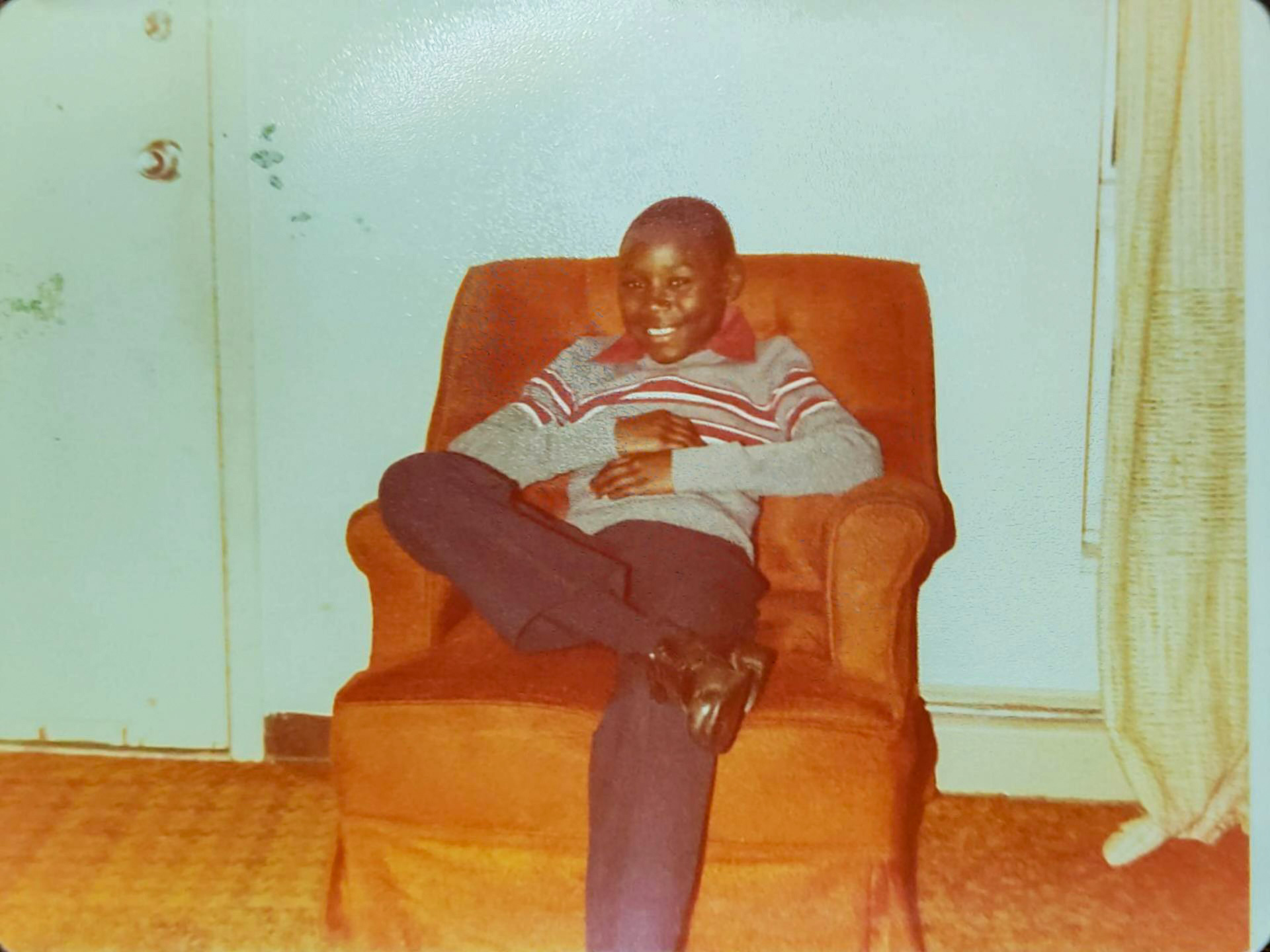
In high school, another transfer—this one crafted by his mother to put her son in the care of a “man who could raise a man”—took Crump to Florida to live with his stepfather. Having earned a scholarship to Florida State University (FSU) in Tallahassee, he became Black Student Union president, leading protests to stop the demolition of the group’s facilities and to oppose a university plan to downsize a program that helped many first-generation students graduate from FSU. Then, Crump went on to law school at the same university.
“He’s always fought for these issues, and at that time, it was really no different. Any injustice that Ben perceived was one that he was willing to fight,” says Sean Pittman, another double Florida State graduate, lawyer and former Orange Bowl Committee president who has known Crump for more than 30 years.
I'm a country lawyer who is unapologetic in the defense of Black life, liberty and the pursuit of happiness.
The Crump whom Pittman sees today is a man who has grown in that purpose. The issues are bigger, but the man is the same.
“He gravitated to the least of these, and he still does,” Pittman says from his home in Tallahassee, where Crump also lives. “He prides himself on standing in the gap between the justice system and the people that are being victimized by it.”
After law school, Crump went into private practice and built a local reputation for walking Black defendants out the courthouse’s front door after trial—an option open only to those acquitted or whose charges were dismissed. His point: the general public, particularly Black people in Tallahassee, could see that Crump and his law partner were persuading mostly white juries and judges to acquit their clients. Calls began to come in from people with legal problems that, they knew, had everything to do with race, people who were—and still are—treated as if they did not matter. Those who say America has become too litigious might not describe personal-injury law this way, but Crump does.
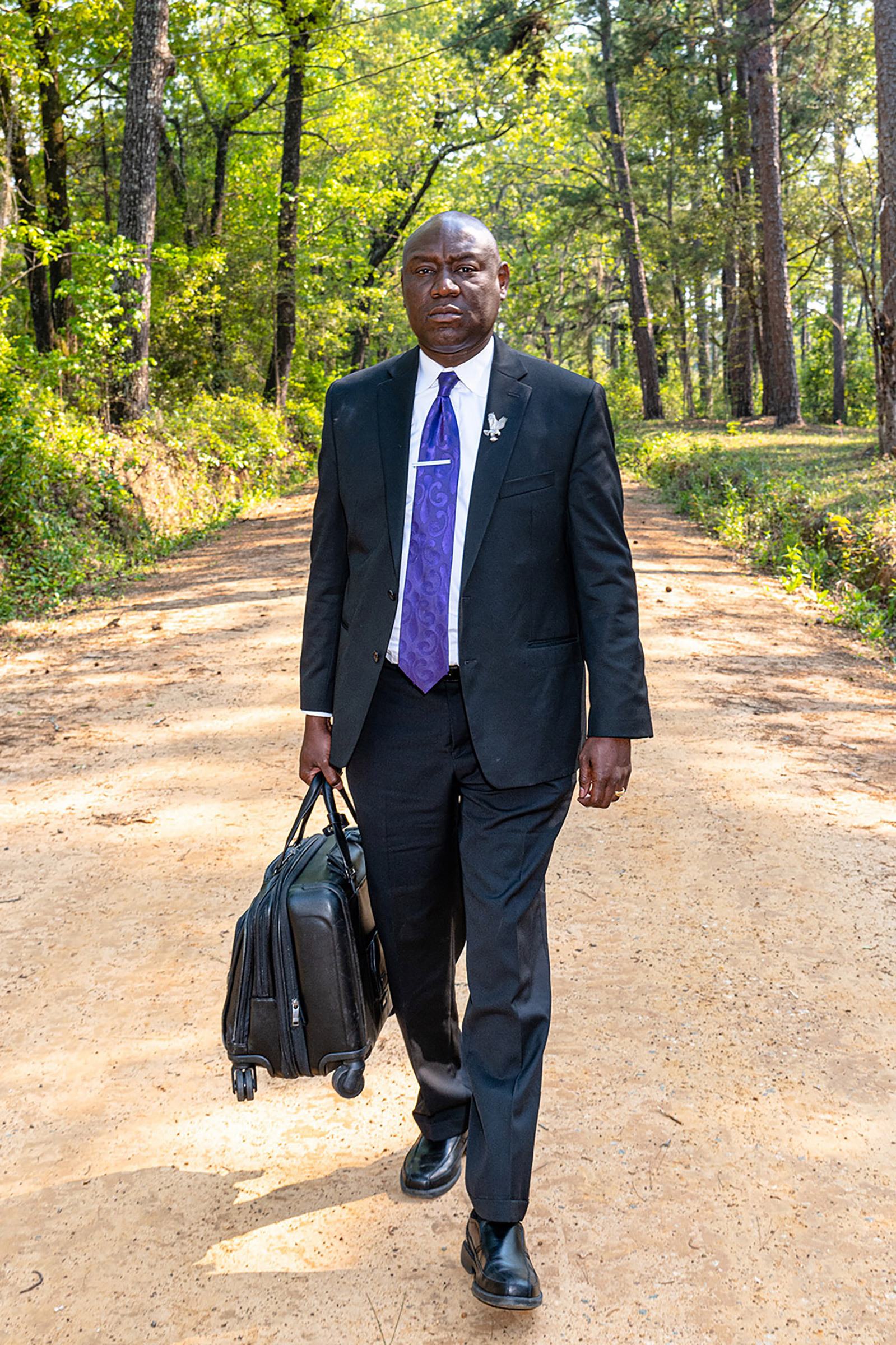
“I’m a country lawyer who is unapologetic in the defense of Black life, liberty and the pursuit of happiness,” Crump tells me.
Two examples: In 2003, Crump filed suit on behalf of Curtis and Annie Jones, a Florida couple who had been through the wringer of workplace-injury law. Curtis Jones had barely survived a 2000 explosion at a manufacturing facility supplying the Department of Defense. Previous fires had killed five other employees, including one who died in the same blast that injured Jones. Jones was burned so severely over most of his body that he remained in a coma for more than two months. He was left with no fingers, and the remnants of his facial features can now be made plain only through his frequent smiles. Under worker’s-compensation law, Jones received benefits, but the company was immune from a separate lawsuit alleging negligence. Crump pursued Jones’ case to the Florida supreme court, winning the right to sue the company and securing a settlement of more than $10 million for the Joneses.
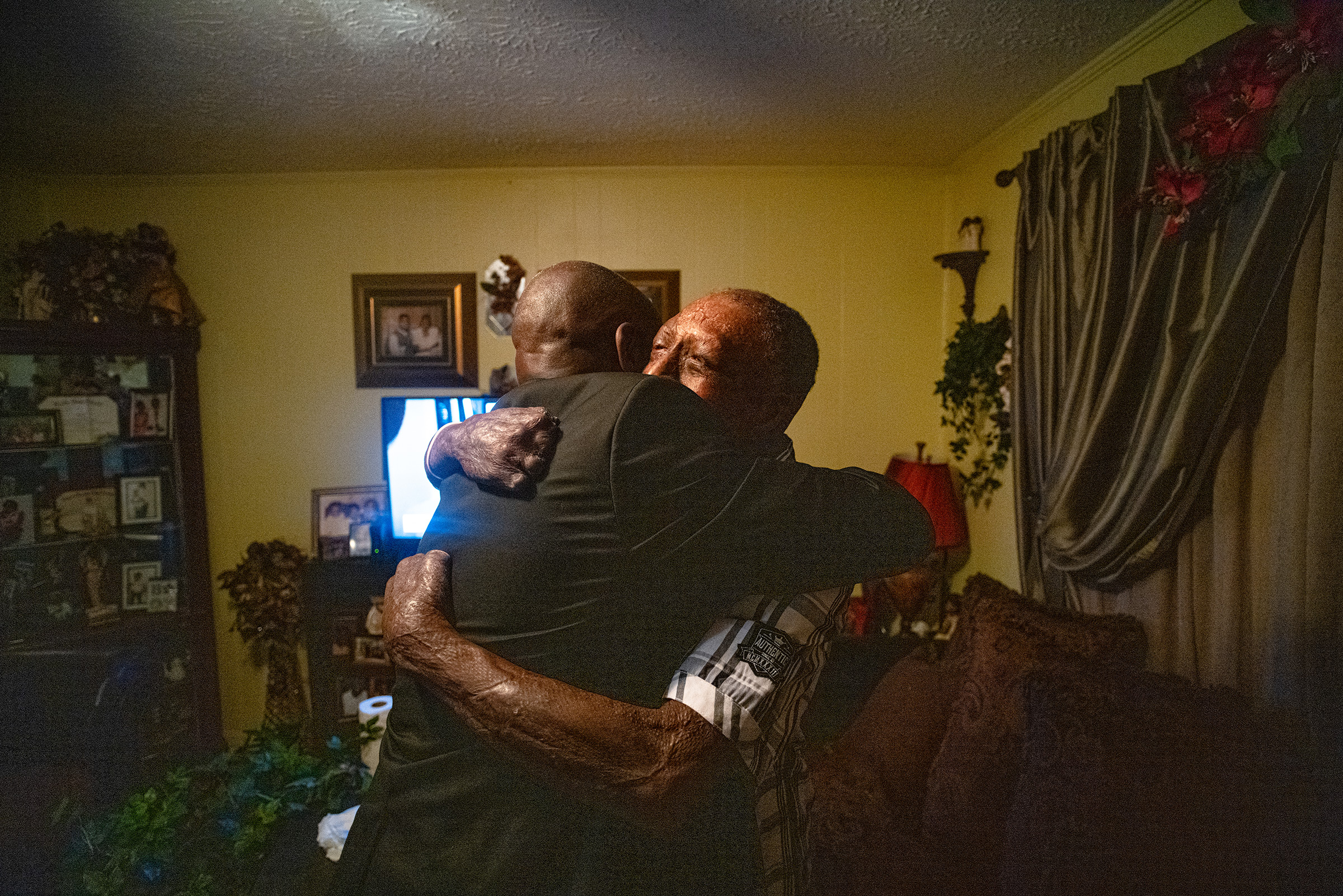
In 2006, Crump and his legal partner at the time filed suit and pressed for criminal charges in the death of a 14-year-old Florida boy, Martin Lee Anderson. Anderson, in custody at a juvenile justice system boot camp for taking his grandmother’s car on a joyride, was out on a required run when he complained that he could not breathe. Guards beat and kicked Anderson into unconsciousness, then forced Anderson to inhale ammonia. Anderson’s death was attributed to natural causes exacerbated by the boy’s genes, until Crump uncovered security-camera footage of the beating and made it public. Crump’s advocacy helped to force then Florida Governor Jeb Bush to appoint a special prosecutor to investigate. The state ultimately settled with Anderson’s family for $5 million and closed all its juvenile boot camps. In 2007, a jury acquitted the guards and nurse of manslaughter.
That’s the kind of work that prompted Tracy Martin, the father of Trayvon, to call Crump in 2012. It’s part of the reason CBS’s Gayle King called Crump “the African American emergency plan” in 2019 and why Sharpton refers to him as Black America’s Attorney General. Ask Crump about those monikers and he shrugs and then, physically, leans in.
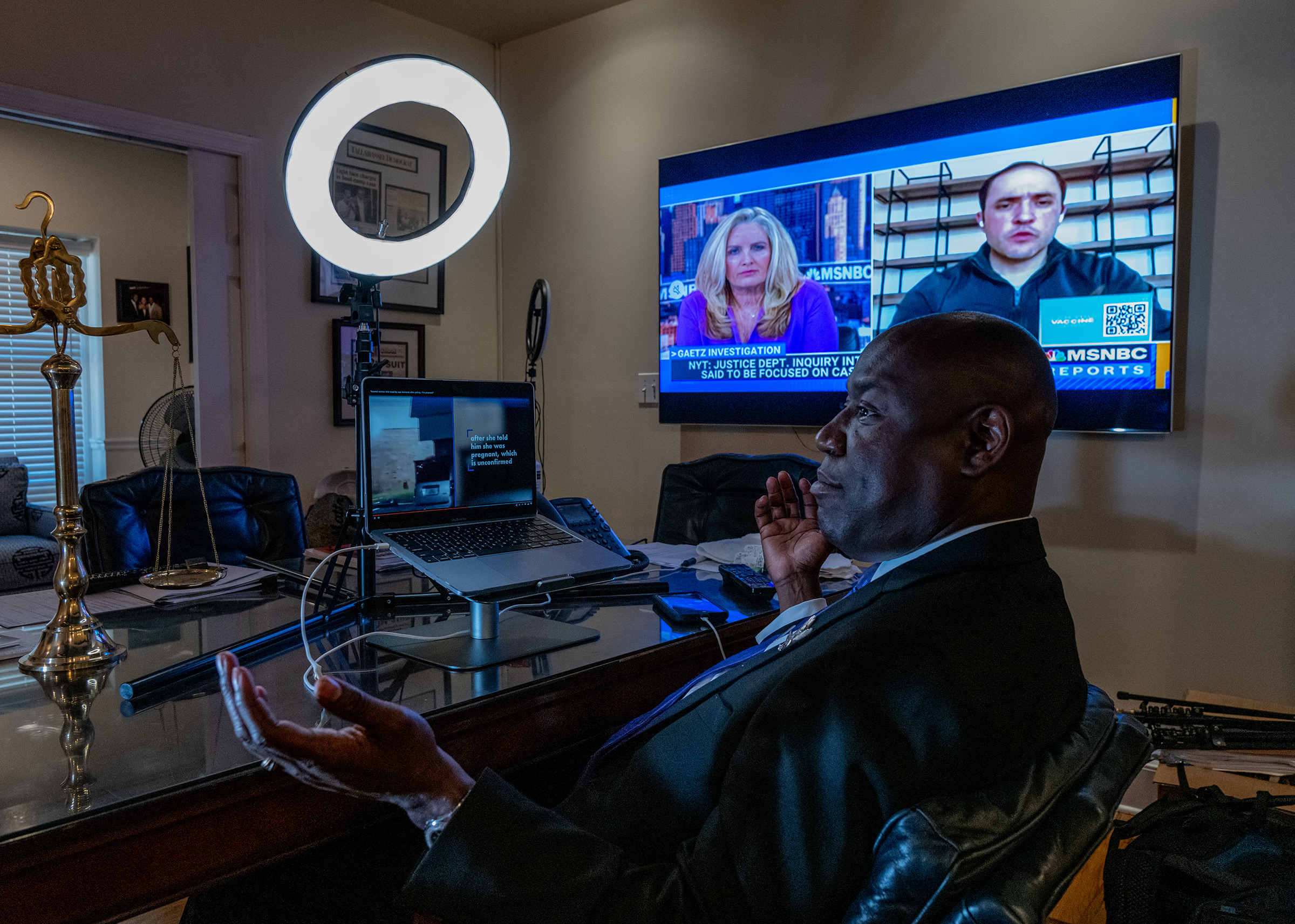
Crump is hyperaware of the moments and the people who pushed and pulled, tried and failed, then beat the drum long enough, loudly enough in just the right spot to make the American legal system envelop more of us in the protective embrace of the law. He doesn’t mind being described as a major figure in that fight. Crump—who grew up in the shadow of the military base where the first Army infantry unit integrated but in a town that took decades to follow—believes that protection should include civil and criminal cases.
He’s just not inclined to speak as if he’s the only one doing the work.
“I hope I do everything I can humanly possible, as long as I can, and when I can’t, I am perfectly O.K. with handing the baton to the next generation,” Crump says.
Read more: ‘My Faith in This World Is Gone.’ For Protesters Injured by Police, There’s No Real Recovery
In the interim, he feels many other lawyers, activists, filmmakers, television producers and writers, artists, preachers, students, teachers, parents, children, journalists, city administrators, elected officials, grave diggers, urban planners and just about everyone else has a role. Some are playing it. Some could but don’t. Crump says his role is not just that of an attorney, but also that of a public figure, what Martin Luther King Jr. called a “drum major” for justice and equality.
Take what happened in 2017 in Camilla, Ga., where a city-owned cemetery remained segregated, with different upkeep schedules and a fence keeping human beings racially divided, even in death. The cemetery’s caretakers took down the fence between the races, he tells me, after Camilla’s first Black mayor hired Crump and as CNN was physically on the way to report the story.
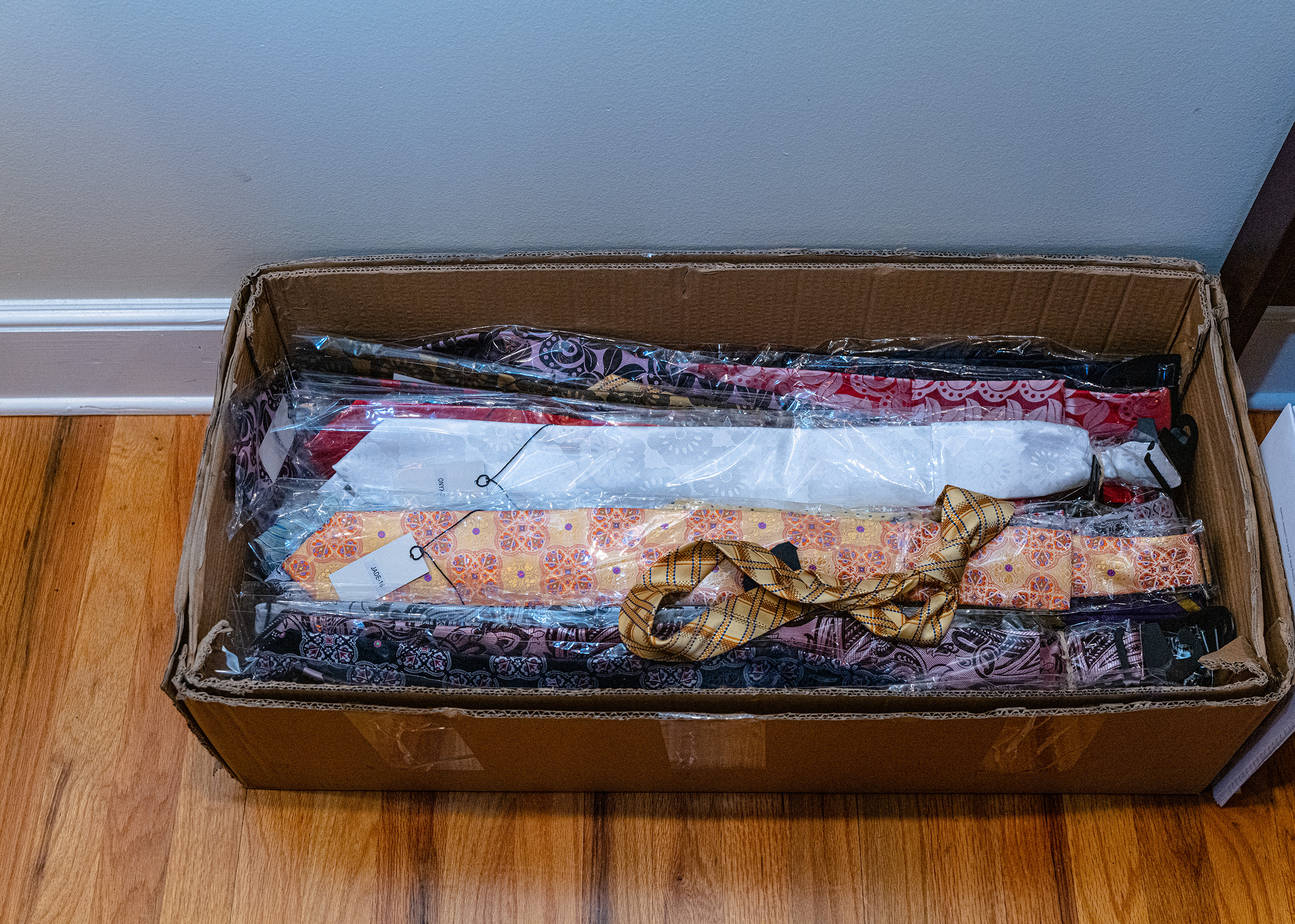
The $27 million argument
On the first day of the Chauvin trial, a few hundred feet from the Hennepin County Government Center, Crump and the rest of the team supporting the Floyd family kneel in a huddle, wind whipping around them, for eight minutes 46 seconds. It is a long, uncomfortable time. It is also what they all believe to be the time Chauvin pressed his knee into Floyd’s body until he died.
“We need to pray that America can live up to its high ideals,” Crump tells the crowd. “We need to pray that America could continue to be the beacon of hope and justice… because the whole world is watching.”
The argument is not entirely different from the one Crump says he made in private with the city attorney and mayor regarding the historic Floyd settlement. Crump approaches negotiations with the idea that everyone present has a stake in what happens, what is said, what is written and what will be remembered by history.
He expresses all of that, early and often, he says. In Minneapolis, city officials themselves arrived with concerns about how to demonstrate that theirs is a community that respected Floyd and all of its residents, a place where terrible deeds are not simply to be shrugged off. As negotiations continued, Crump says he made it clear that if the civil case went to court, the city likely faced a lengthy trial alleging its police had a pattern of violating departmental procedures and breaking the law. In that case, the Floyd family was likely to win an even larger payment, he explained, than if a settlement was reached.
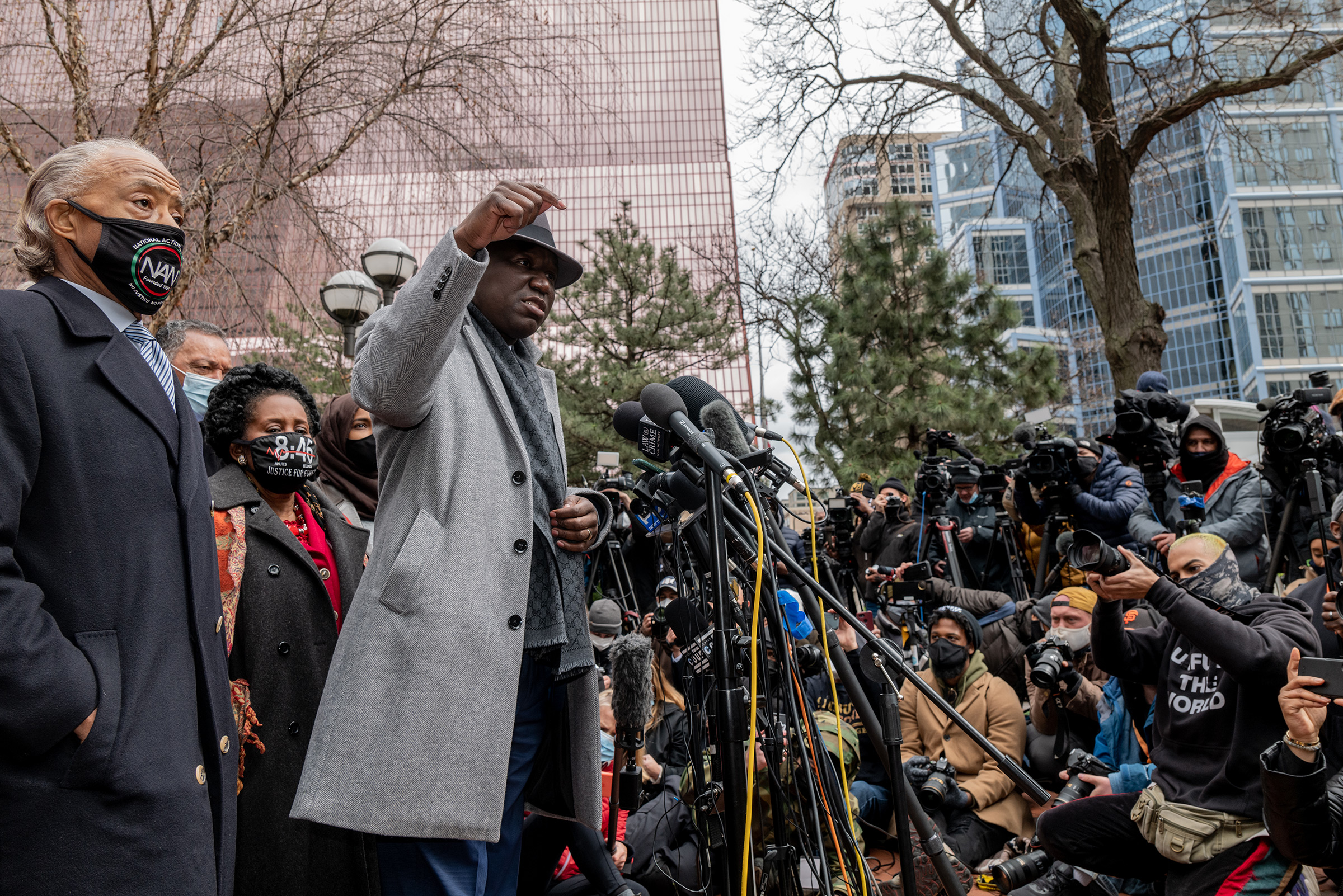
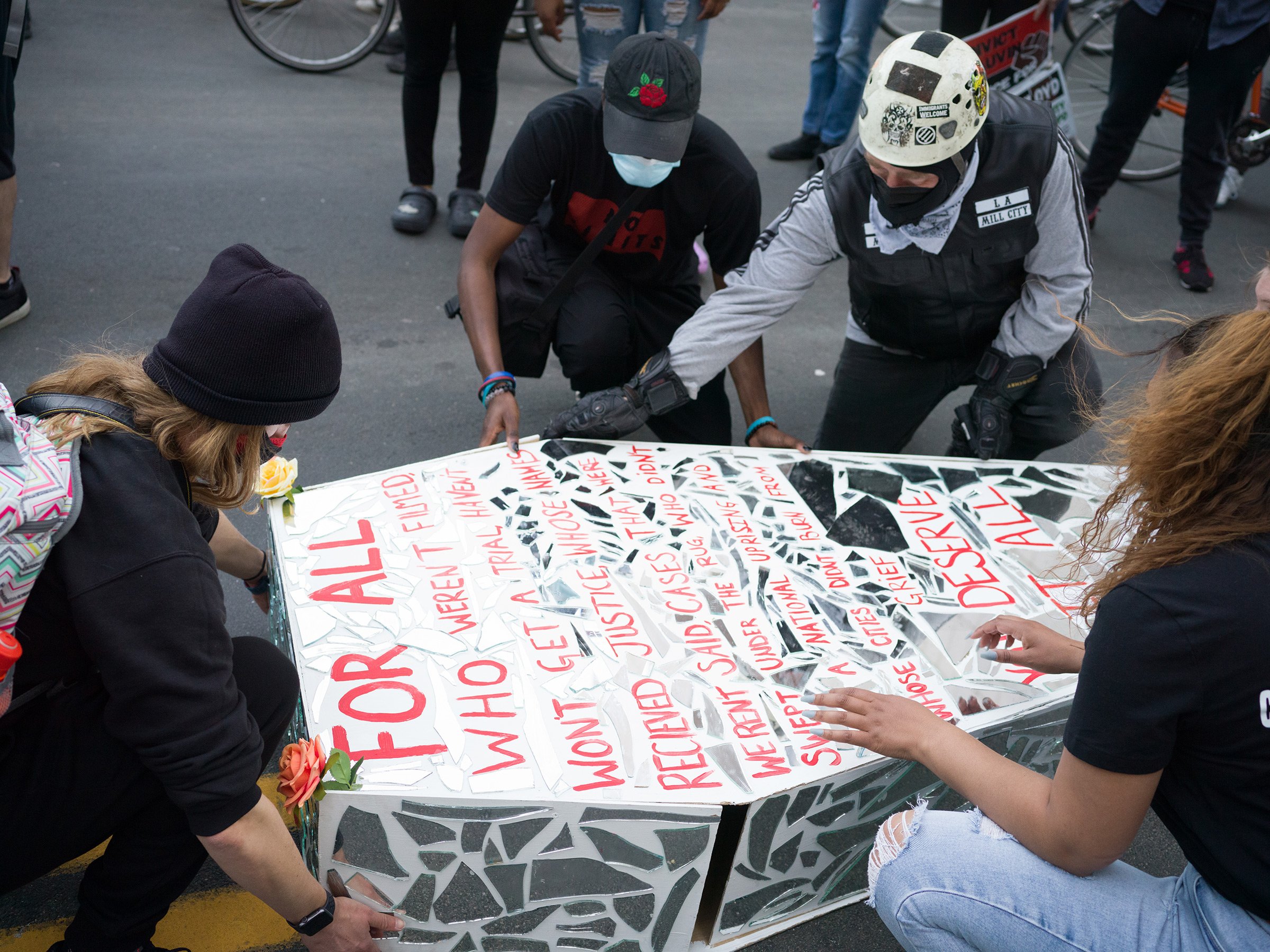
“The real question,” Crump says he told city officials, “is, Do you want to put your city through that…or do you want to try to talk about how we solve these issues together and be in partnership and say that we want to be on the right side of history.”
The work produced policy changes and what the local paper described as the single largest pre-trial settlement in a civil rights-related wrongful death case in U.S. history. Negotiations with officials in Louisville, Ky., after police shot and killed 26-year-old Breonna Taylor in her own apartment were similar, Crump says. They produced a $12 million agreement, the single largest payout connected to the wrongful death of a Black woman caused by police in U.S. history, as well as a series of policy and practice commitments.
The U.S. Department of Justice has since announced plans to investigate policing patterns and practices in both cities.
In a statement to TIME, Minneapolis city attorney Jim Rowader described his working relationship with Crump as “extremely positive and productive” and said the settlement “reflects a shared commitment to advancing racial justice and a sustained push for police reform.”
In Minneapolis on the first day of the Chauvin trial, as Crump disappears inside the courthouse, a group of protesters puts a coffin on the ground. It’s covered in the broken shards of a mirror. On the top, someone has written in red paint: “FOR ALL WHO WEREN’T FILMED, WON’T GET A TRIAL, HAVEN’T RECEIVED JUSTICE, WHOSE NAMES WEREN’T SAID, CASES THAT WERE SWEPT UNDER THE RUG, WHO DIDN’T GET A NATIONAL UPRISING AND WHOSE CITIES DIDN’T BURN FROM GRIEF, YOU DESERVED IT ALL.”
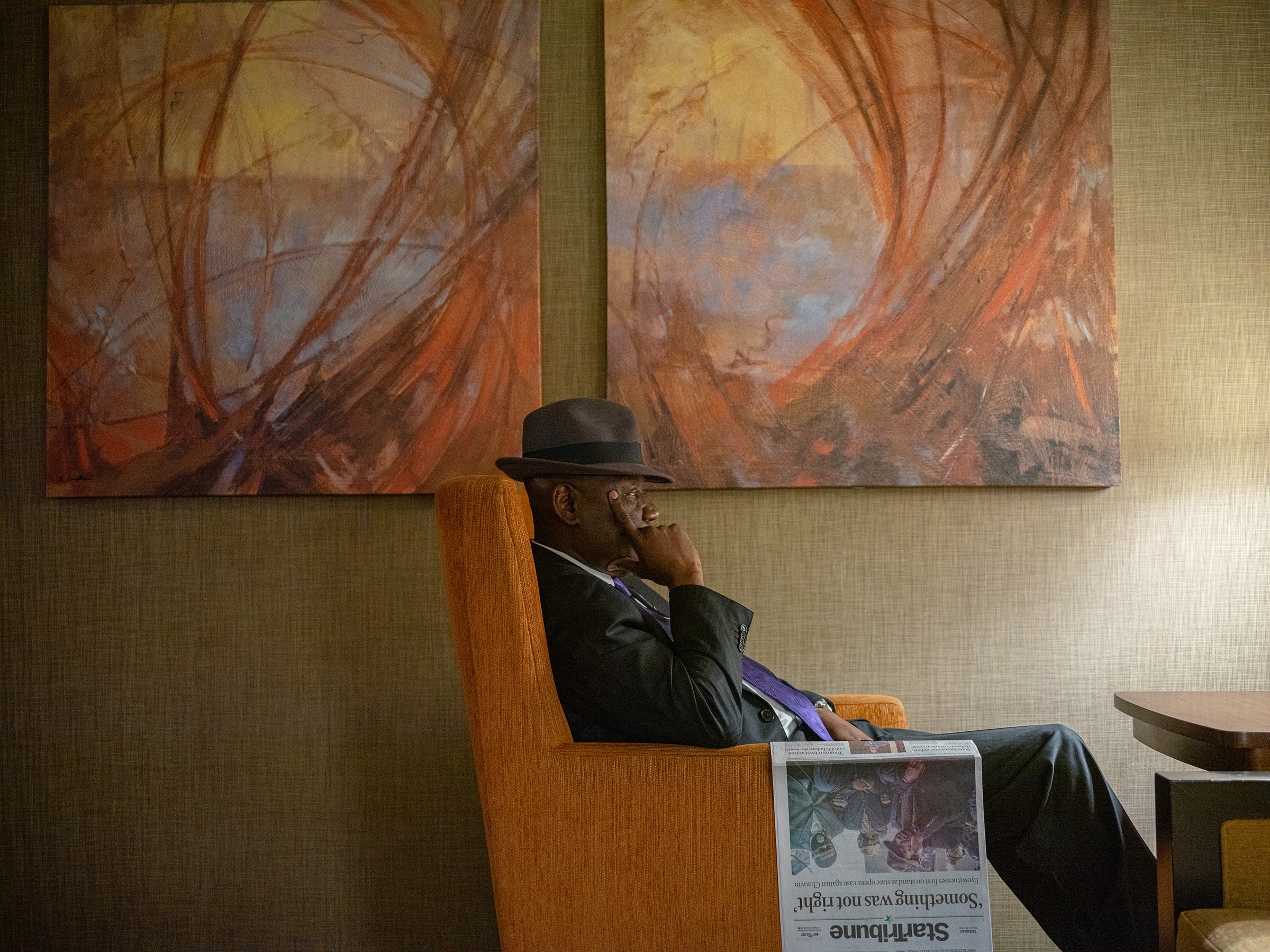
Over the next day, Crump is so busy moving between the courthouse and hotel for live television interviews that when I see him, what I see is just a blur shaped something like the man known as Ben Crump. He’s in demand on cable and radio. He’s offering assessments of the day’s events and what is to come. He’s trying to press into the public’s understanding the same ideas he brought forward at that vigil: that there’s something terribly wrong with a legal system where that tape of Floyd’s final moments is in evidence, and yet Chauvin stands even a chance of walking out of the courthouse when the trial ends.
Crump is doing all his unofficial legal work while tailed by a crew producing a Netflix documentary—from Nadia Hallgren, the filmmaker responsible for Michelle Obama’s Becoming film—that’s slated for early next year. Like Obama, Crump has written a memoir, Open Season: Legalized Genocide of Colored People, and has appeared in multiple documentaries and a feature film, a biopic of his hero Marshall. He is asked to stop and pose for selfies in hotel lobbies and on city streets. But on the second morning of the trial, when he takes a seat at a table inside a dim lobby restaurant with some of his staff, Crump, who never seems to meet a stranger, is unusually quiet.
A few days earlier, a Black man had been killed by police in Virginia Beach, Va. Police, as is often the case, have told a story in which the man fired at them. The person in the best position to refute any portion of that is dead. And the man’s family has called Crump’s office. Crump begins to talk about it in an elliptical way.
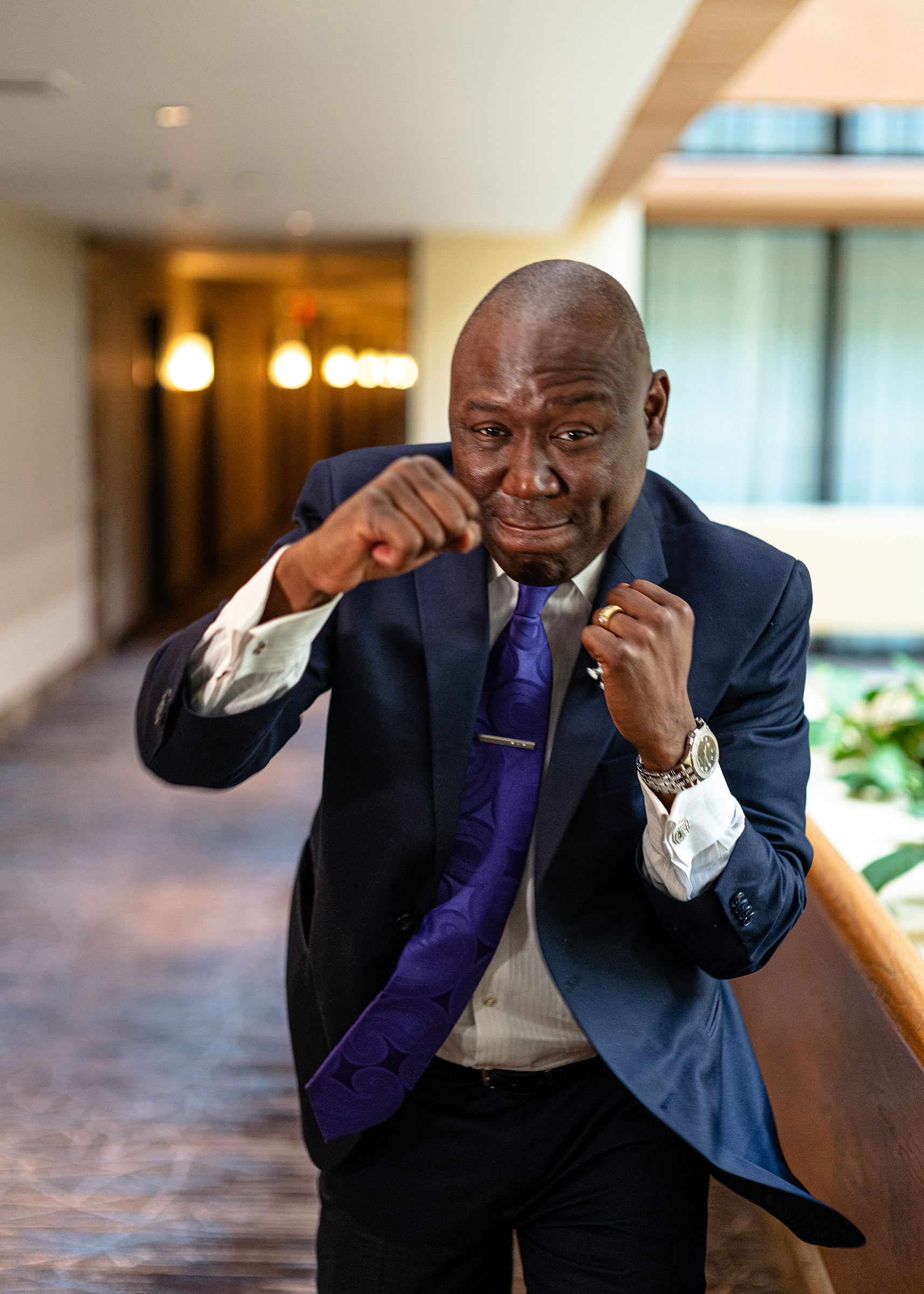
“I think we’ll have to see,” Crump says to Adner Marcelin, a young associate and jack-of-all-trades in Crump’s now 14-city law firm. “You know the big questions.”
On the way to the courthouse, Crump explains the big questions, the somber mood. The choices he has to make are difficult. There are more people being killed than he or anyone else can represent. There’s a new hashtag memorializing or screaming for justice for some poor soul every day. It’s the stuff of Crump’s recurrent nightmares, he tells me.
“I’m still evaluating that,” Crump says referring to the situation in Virginia. “It might be something. But they are also saying that this young man had a gun and they shot at the police… So I have to be careful, because if the body-cam video shows them shooting at the police, they will try to say, Oh y’all tried to make a big deal.”
These days, Crump only has the bandwidth to take cases where elements of what happened “shock the conscience.” He will not take cases where anyone, dead or alive, was armed and used their weapon against an officer. “I take cases that help David beat Goliath,” he says. “Because where’s the glory in helping Goliath beat David?”
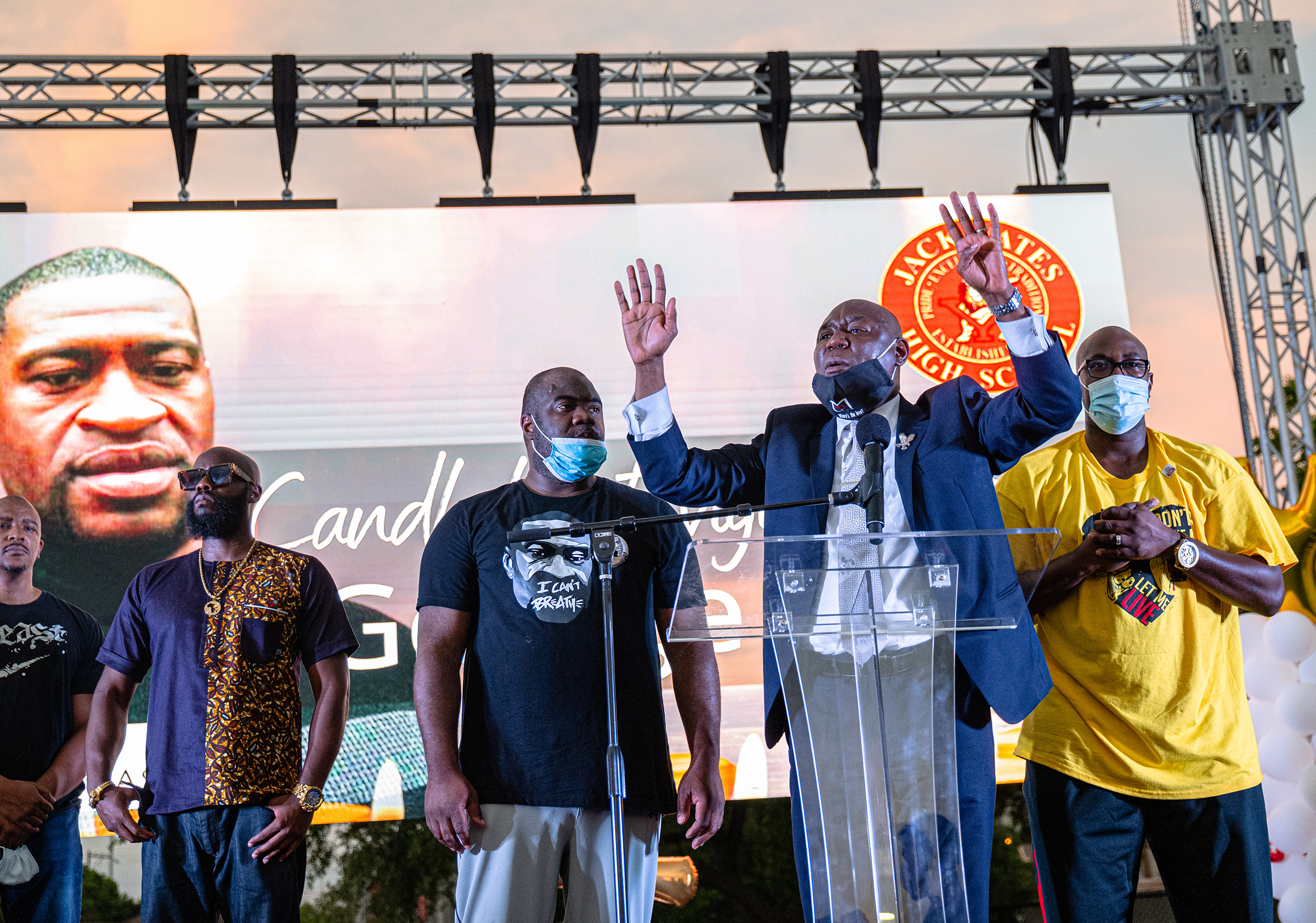
What a Life Is Worth
Crump decides not to take the Virginia case, and in doing so highlights something else he does not do, despite the assumptions of his most cynical critics: He does not contact families to encourage them to file suit. ABA rules forbid that, and lawyers who do it risk censure or disbarment. Families, many of whom watched Crump speak for Trayvon Martin and his grieving parents in Florida nine years ago, or for an almost innumerable list of victims since then, call him.
Crump tells me he doesn’t expect to be everyone’s favorite person. All his personal heroes—Marshall and King, to name two—were hated in their lifetimes, their work and their tactics criticized by both those who opposed them and those who claimed their way was wrong.
“You understand that you not gone be loved by everybody and hopefully history will get it right,” Crump said. “But if they don’t, you know in your heart what you were fighting for.”
Daniel Cameron, Kentucky’s attorney general—a Black Republican and acolyte of Senate Minority Leader Mitch McConnell—is among those who have publicly criticized Crump’s methods. Cameron told FOX News’ Fox & Friends in October, as Crump advocated on behalf of the family of Breonna Taylor, that Crump “goes into a city, creates a narrative, cherry-picks facts … creates chaos … then he leaves with his money, and then asks the community to pick up the pieces.”
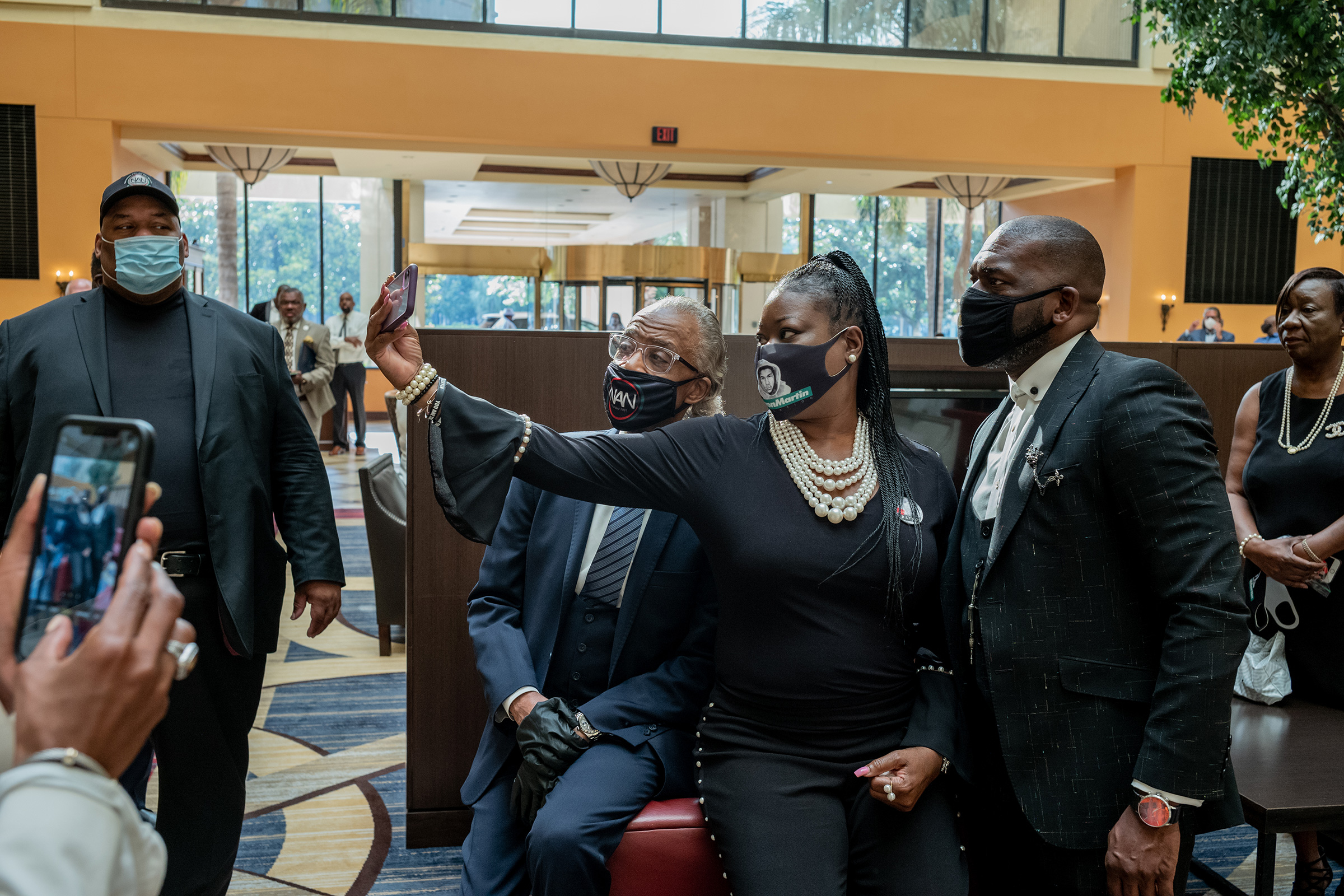
Crump’s fees are the industry standard for cases taken on with an agreement that the client pays nothing until the case ends. Those who win a judgment in court or receive a settlement typically pay their lawyers 33% to 40%. The Floyd settlement is no different. The four law firms involved will divide up to 40% of $27 million; Crump, who employs about 110 people, will take in at most $2.7 million before taxes. He makes most of his money and pays his staff, he explains, with income from less visible cases—banking discrimination, product liability and other issues—rather than those involving policing. In 2020, for example, Crump won a personal-injury case, conducted via Zoom, for $411 million.
Read more: Black Citizens of Minneapolis Have Been ‘Living in a Perpetual State of Trauma’
Cameron is not the only one to criticize Crump’s methods. A small number of former clients seem to view his track record—of civil penalties paid out by cities whose police face no criminal charges, something Crump has no power over as a private lawyer—as a distraction. Both Leon Ford Jr., a young Black man paralyzed by Pittsburgh police in 2012 in a case of mistaken identity, and Samaria Rice, mother of Tamir Rice, a 12-year-old boy killed by Cleveland police in 2014, publicly said they would not hire Crump if they had it to do over again. Rice, who declined to comment further, has described Crump’s legal knowledge as insufficient and his approach a diversion from what she really wants: justice. Both Rice and Ford, who did not respond to a request for comment, hired new lawyers and settlements of $6 million or less; the officers in the Rice case were not prosecuted, and two officers involved in Ford’s case faced federal civil rights charges but were not convicted.
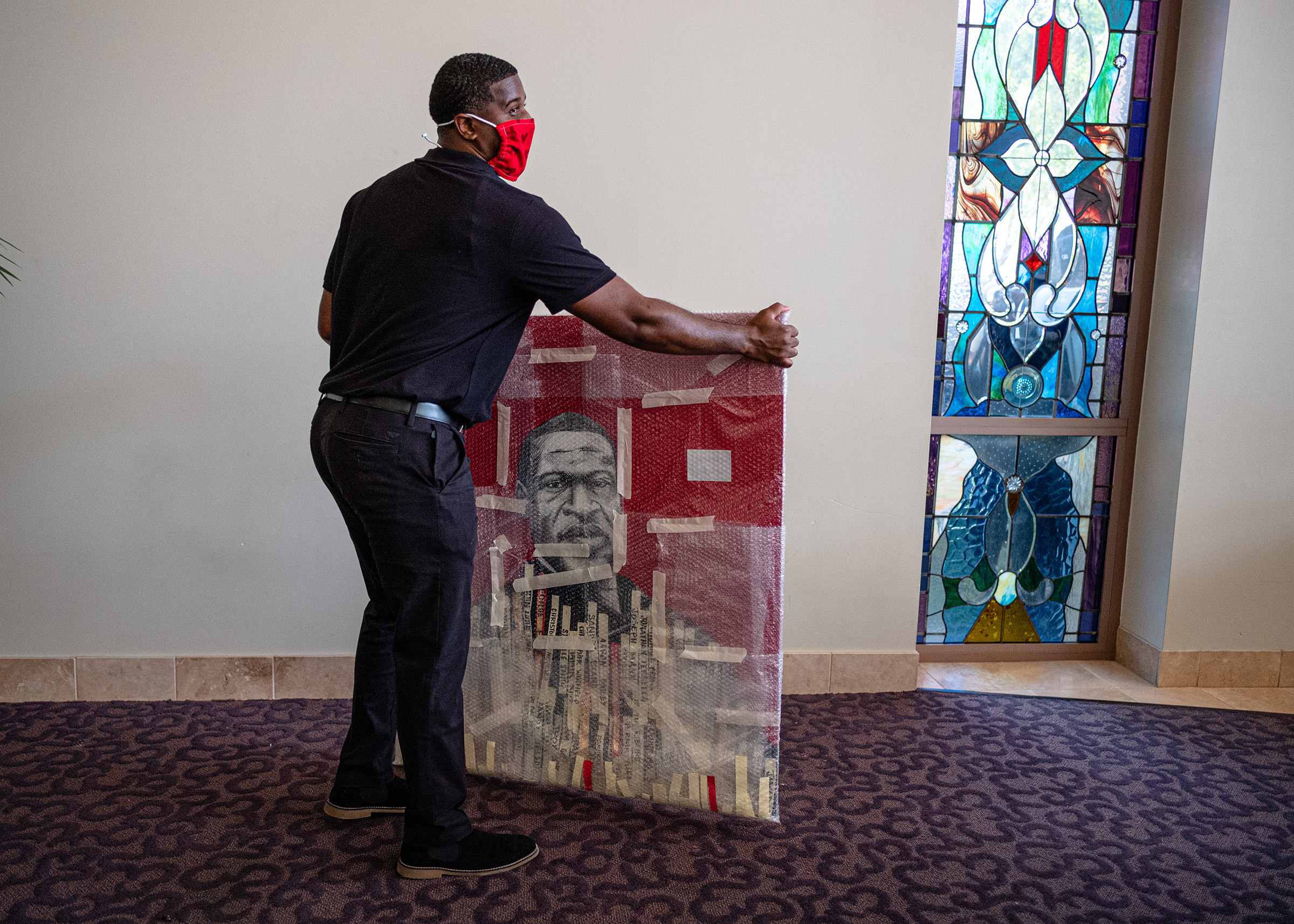
Asked about these criticisms, Crump is at once philosophical and practical.
“I’m … trying to raise the value of Black life,” Crump says of the civil suits he files. “Every chance and every opportunity that I get.“
And it’s not just a matter of funneling dollars to wronged and grieving families. There may well be a point, Crump says, at which the current state of police accountability becomes unsustainable. The price tag of civil litigation could simply outstrip insurance coverage or overrun a city budget, forcing policing changes.
“I used to think that if every time they shot a Black man in America they were forced to pay a million dollars,” Crump says, “then that would be the last Black man shot in the back. That wasn’t true. So I said to myself, We got to get that number up.”
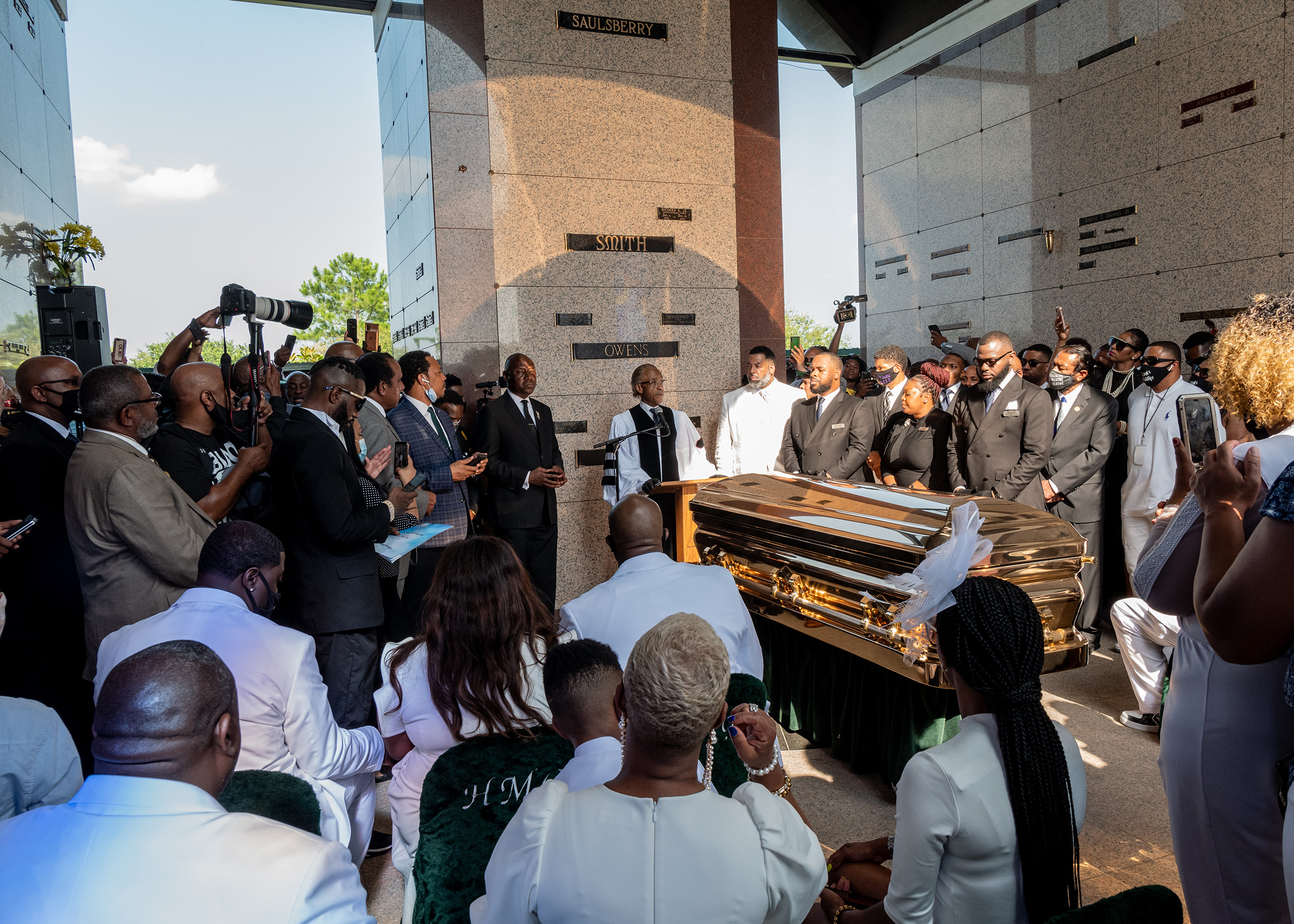
Rashawn Ray, a sociologist at the University of Maryland and a governance-studies fellow at the Brookings Institution who studies how racial inequality is sustained, said that while specific policy reforms are needed, he admires how Crump has made the issue of police conduct a major part of the national conversation.
“Over the last five years in the top 20 metro areas of the country, over $2 billion has been paid out in civilian payouts,” says Ray, the executive director of the University of Maryland’s Lab for Applied Social Science Research. “These are just the major metro areas. But here’s what we know. We talk about the tip of the iceberg, the George Floyds, the Korryn Gaines and Tamir Rice shooting … But one thing we do know is that of late there have been more payouts in rural and suburban areas.”
I used to think that if every time they shot a Black man in America they were forced to pay a million dollars, then that would be the last Black man shot in the back.
There’s also the reality, Crump says, that in America money tends to be a pretty accurate gauge of what and whom we value. In fact, formulas that justify the practice of paying less for damages or injuries done to people of color may be creating a perverse incentive for companies to be more reckless with Black lives, according to a 2018 report released by the Lawyer’s Committee for Civil Rights Under Law. Crump reasons that similar conclusions have been reached by government agencies that could hold problem officers accountable.
In 2019, Minneapolis paid $20 million to the family of Justine Damond, a white woman mistakenly killed by a police officer. The payout topped the city’s sum total in alleged police-misconduct payouts made to mostly Black families over the preceding decade. And Mohamed Noor, the Black Somali-American immigrant who killed Damond, became the first Minnesota police officer convicted of a crime in connection with an on-duty shooting. Noor was given a 12-year prison term, also a first.
“Why can’t Black people have the same thing? We want full justice,” Crump says. He will repeat this idea in some way many times before the Chauvin trial ends. “Not partial justice. Geroge Floyd’s family deserves a settlement and a conviction just like Justine Damond’s family did.”
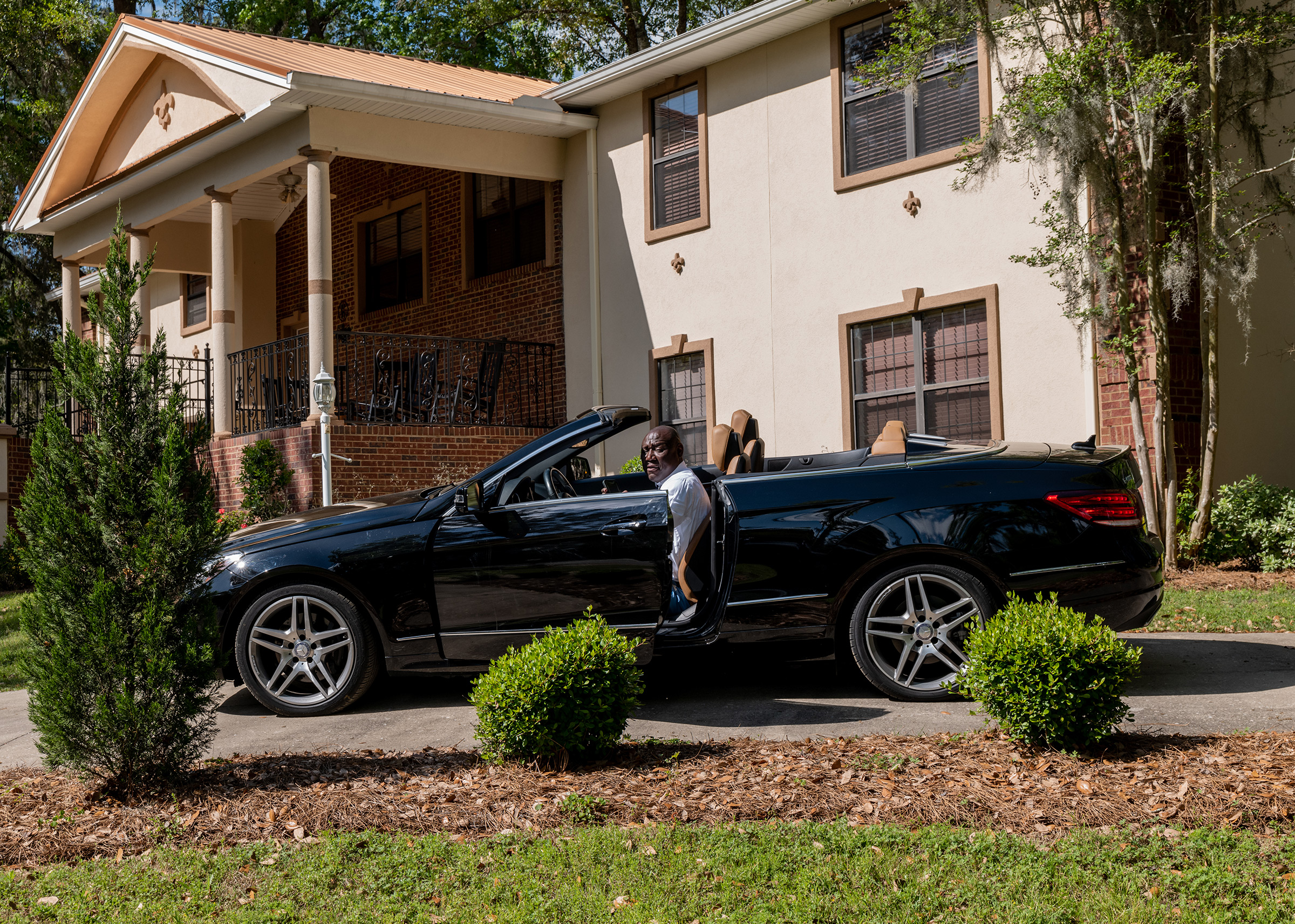
No Day of Rest
On Easter weekend, some combination of the holiday, the type of testimony expected in the Chauvin trial and the need for clean clothes takes Crump home to Tallahassee. To fly from Minneapolis to the Florida city, with layovers, can sometimes take 13 hours.
And just because it’s Easter Sunday, that does not mean it’s a day of rest for Ben Crump. Before church with his wife of 22 years and 8-year-old daughter, Crump heads to his downtown office. What looks like a modest one-story burnt sienna stucco building has soaring, vaulted ceilings inside and office space for multiple lawyers working for the Crump firm. Professionally matted newspaper stories about Crump and awards from just about every civic organization imaginable dominate the decor.
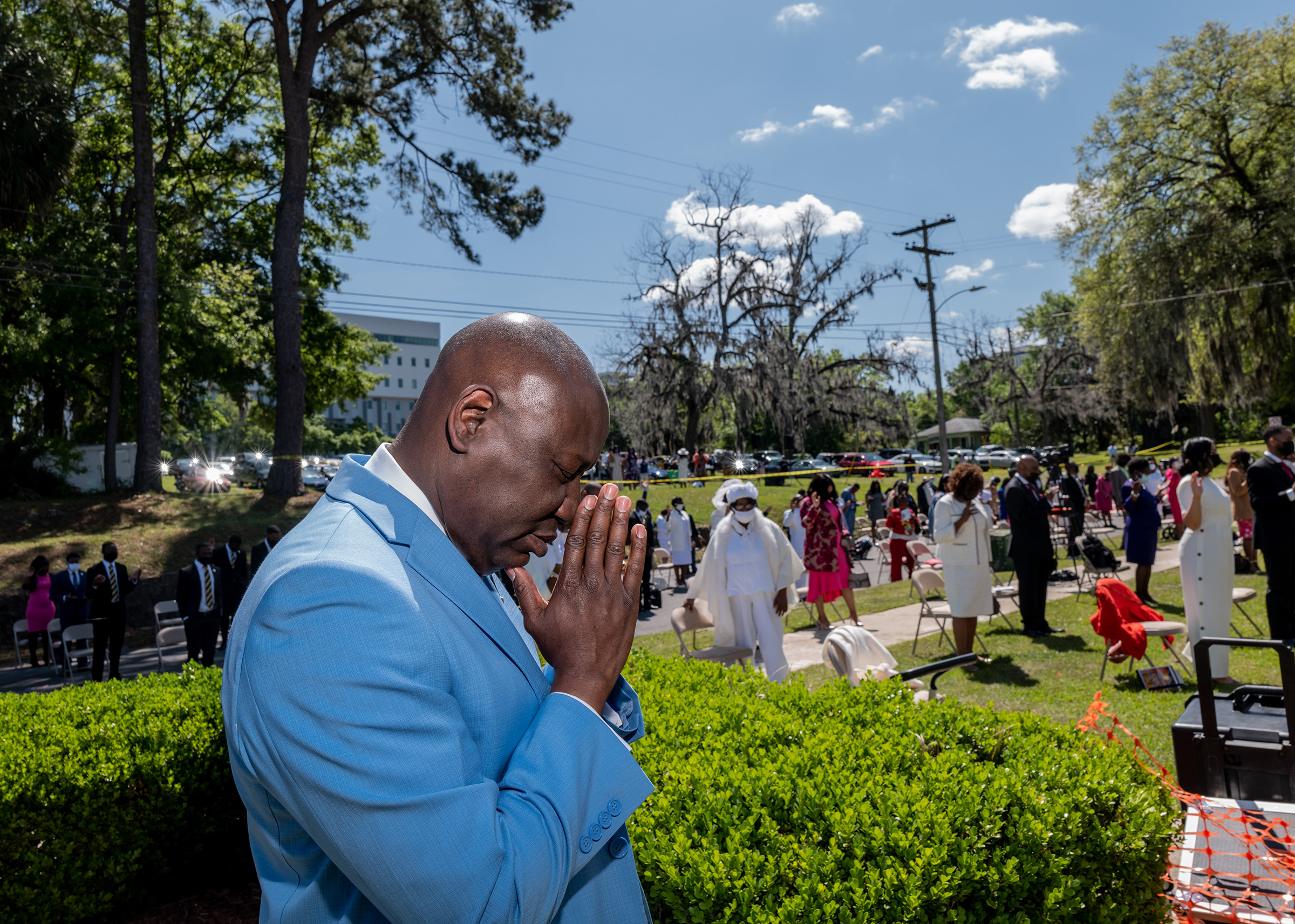
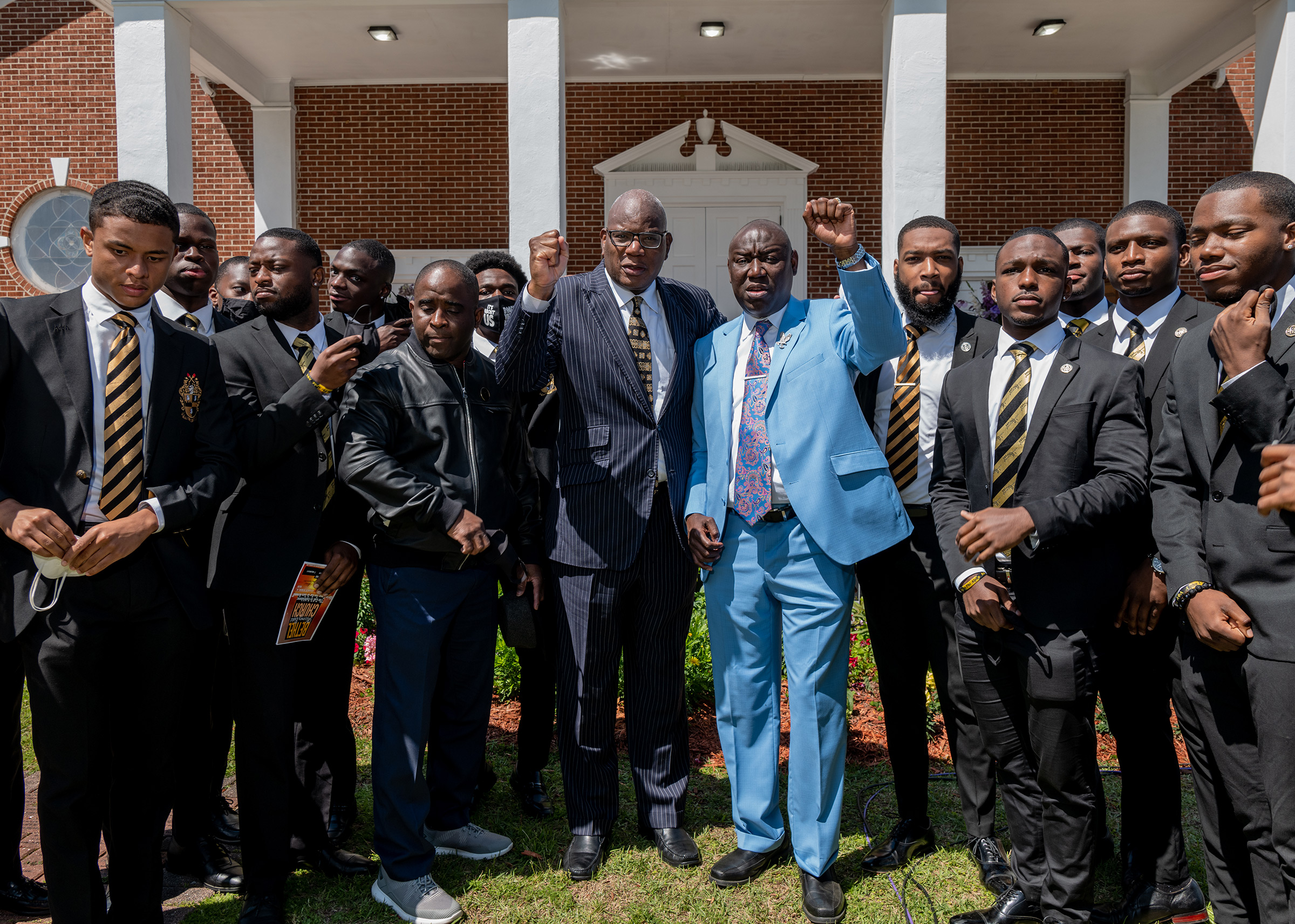
Near the entrance to his personal office are two certificates showing Crump has credentials to argue a case before the Florida and U.S. Supreme Courts. Inside, alongside various symbols of justice—a trio of brass scales, a sculpture of an eagle in flight—there’s a laptop and a ring light set up for TV appearances, like the one he’s filming now. When the host turns to Crump, he talks about events in the trial that week, including the revelation that Chauvin kneeled on Floyd’s body not for eight minutes and 46 seconds, that eternity Crump demonstrated outside the courthouse, but for nine minutes 29 seconds. Crump speaks of the evocative testimony of two young cousins who witnessed what happened. He speaks of how the lawyer defending Chauvin has put blame on bystanders who pleaded with the cop to remove his knee. When he’s done, Crump heads to church.
Read more: Buoyed By Chauvin Conviction, the Police Reform Movement Looks Ahead
There, like so many things during the pandemic, the setup has been adapted for the times. The pastor and a few others are stationed on the church’s front porch facing a lawn; congregants sit on folding metal chairs, lawn chairs or in their air-conditioned cars. Crump takes a seat near the back of the street seating but is quickly redirected toward an isolated folding chair next to a bush only a few feet from the porch serving as the dais. The service will reference his work and the need for justice in America, and he’ll be asked to offer an update on what’s happening in Minneapolis. When the service ends, a kind of line forms to speak with Crump, to shake his hand, to share a thought.
A group of young men in matching blazers and ties pose for individual and group pictures with Crump. The way these young men linger eventually makes clear that this isn’t mere Gen Z social media post obsession. For them, Crump is not just a known name, or a commercial success who arrived in a Mercedes. He is their champion, the person trying to push the legal system to protect people like them, people who contend every day with what it means to be considered a threat.
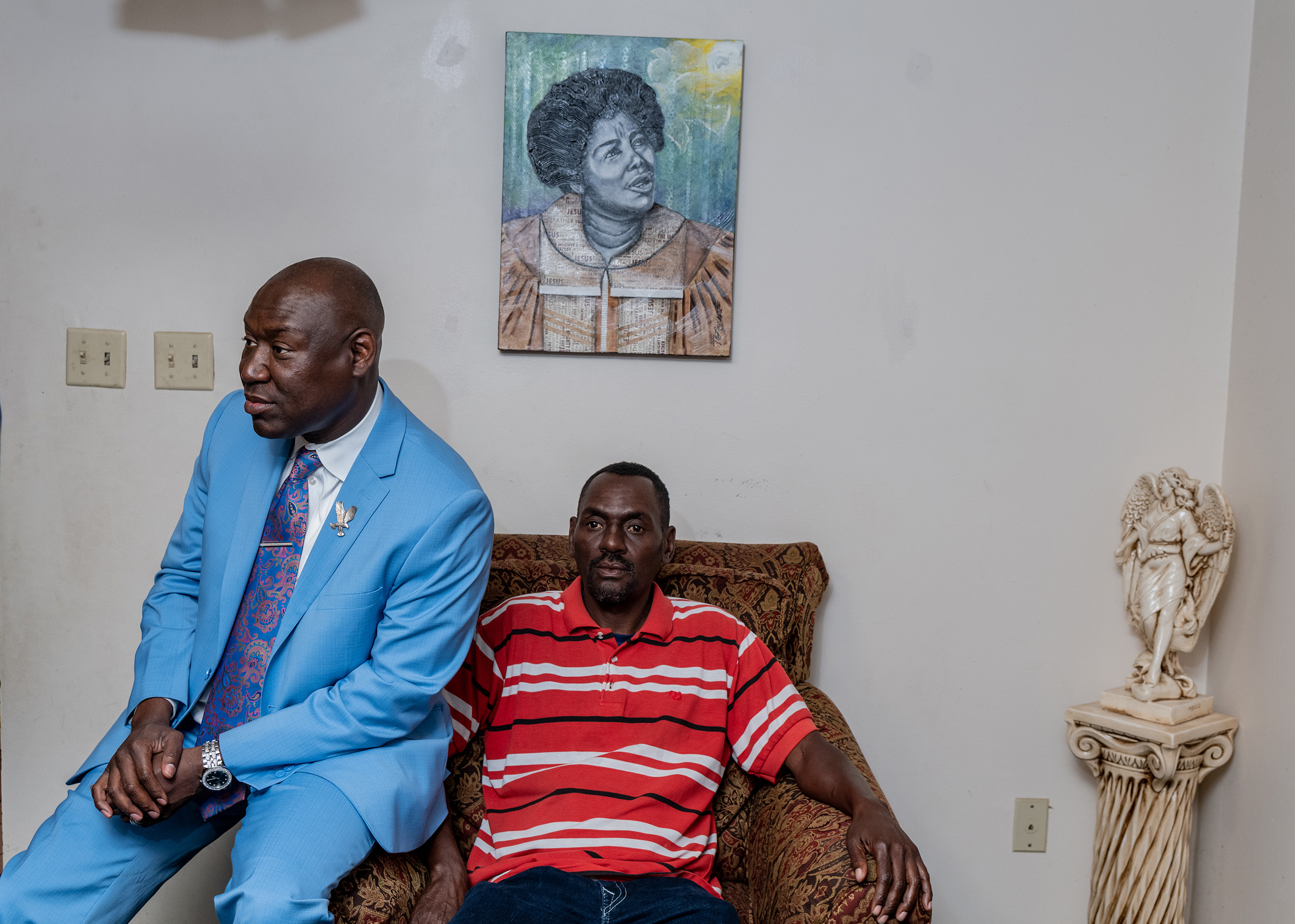
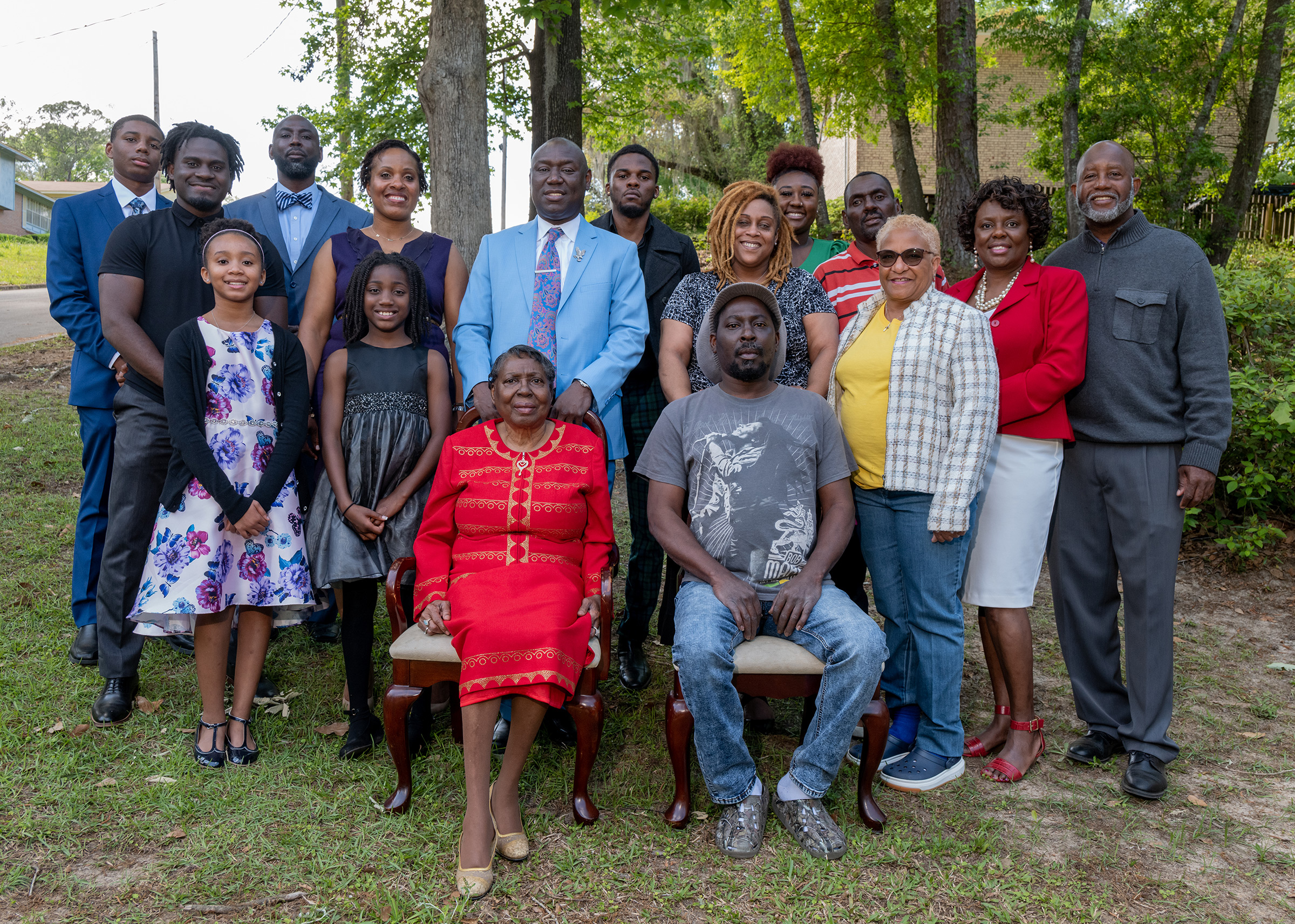
When Crump went to Minneapolis at the start of the trial, he planned to spend five days there and then take a rare break. His plan, he told me, was to be in Florida for a week, “unless they kill somebody else,” a strikingly grim qualification.
It didn’t happen that week. But it did the following Sunday.
Daunte Wright was shot and killed by a police officer in Brooklyn Center, a suburb near Minneapolis, during a traffic stop. His family called Crump. Crump took the case.
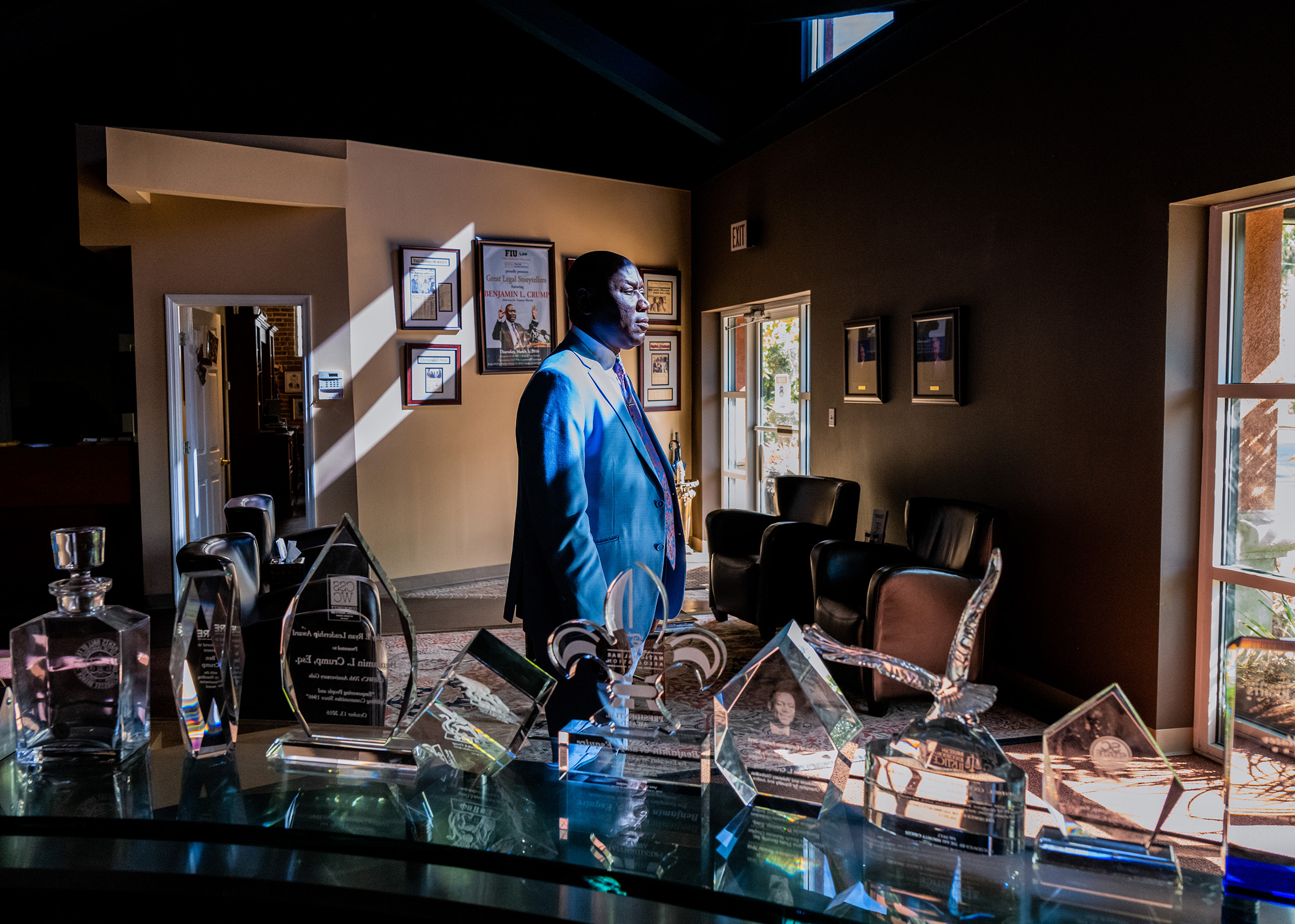
‘Get Ready’
Crump rises early on April 20, unable to sleep past 2:30 or 3 a.m., he says. He dresses for a TV appearance, prays, reads and paces. He is fairly certain the verdict will come in that day. The jury had deliberated past the hour the judge required on its first night, an indicator they were perhaps eager to finish the job. Many lawyers believe that, with juries, the faster they return, the more likely it is the defendant will be convicted. But nothing is certain. The jury that acquitted O.J. Simpson finished its work in about three hours. Crump is certain enough to offer me a warning when I go to the hotel lobby for coffee at 7:30 a.m.
“Get ready,” he tells me, because I’ve asked to follow the Floyd family on the day of the verdict. “Everything you need. Ain’t no telling what happens next.”
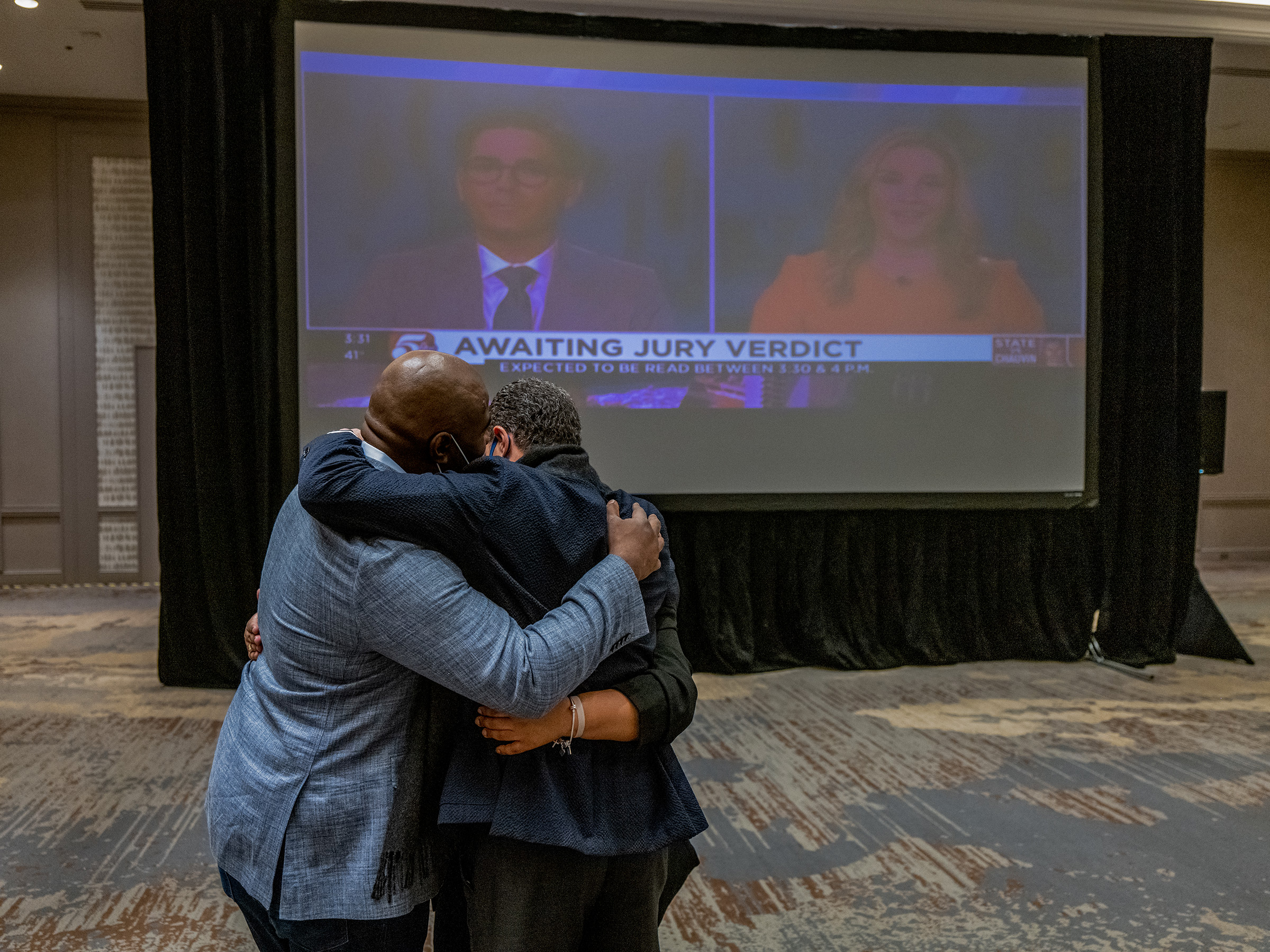
Around 2:20 p.m., some members of Floyd’s family—two brothers, one of their wives, his nephew and his nephew’s long-time girlfriend, two cousins, plus three lawyers who work with Crump—are in a conference room. Food from one of the only restaurants delivering to downtown Minneapolis that day has arrived. As the others eat and talk about their expectations, their fears, their insomnia, nobody pays attention to Crump when he quietly answers his cell phone.
But when he hangs up, it’s to address the room.
“All right, y’all,” Crump says, low and slow, phone still in hand. “That was it. The call. The verdict is in.”
The jury has been out less than 11 hours. Guilty on all counts.
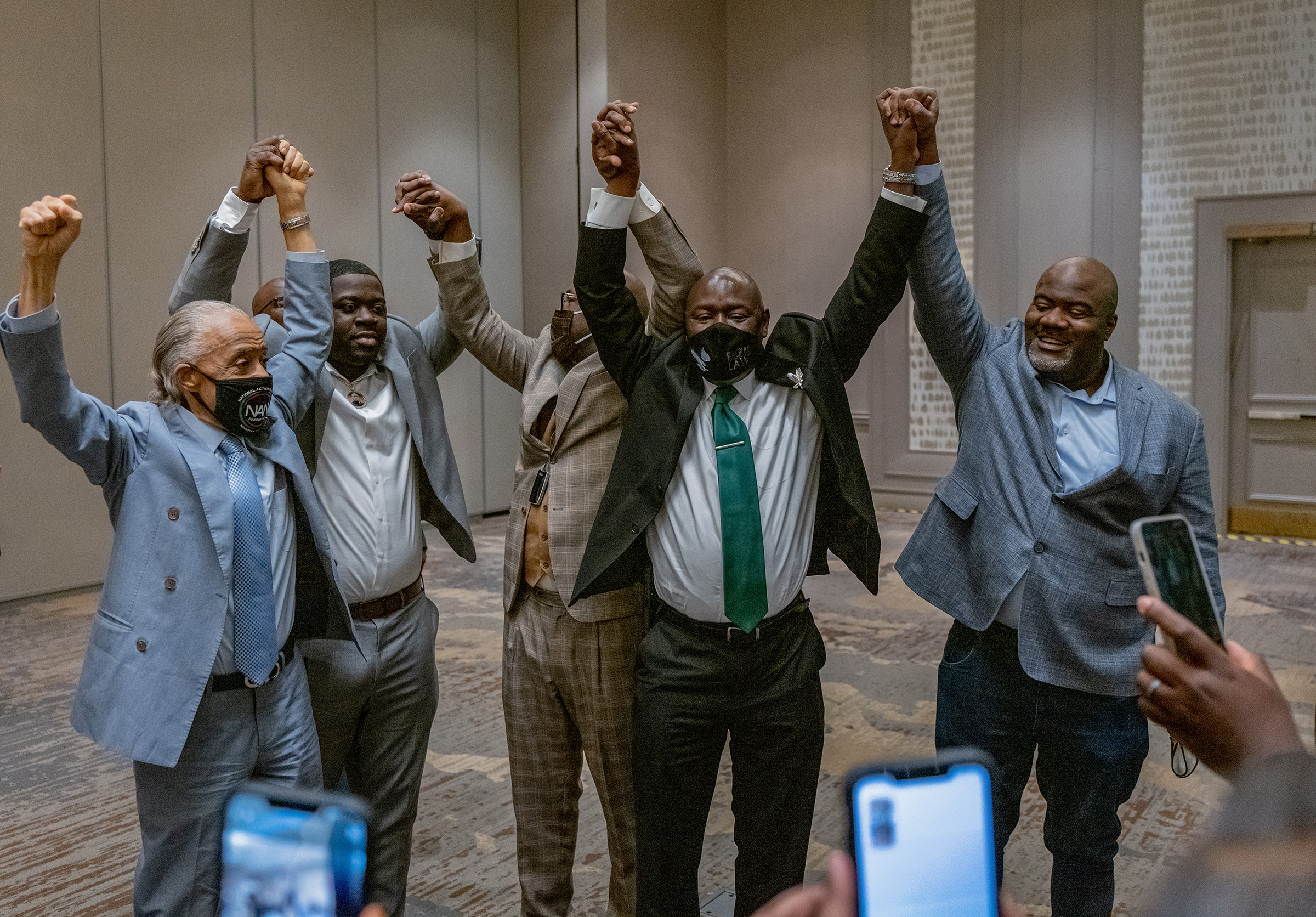
About an hour later, in a hotel ballroom where most of the Floyd family have convened to watch the verdict announcement on TV, Crump and Philonise Floyd are enveloped by most of the people in the room. When they begin to scatter, a small group of men—Sharpton; Marc Morial, president of the National Urban League; and the Rev. Jesse Jackson—remain, an echo of the huddle from the night before the trial began. This time, the mood is different. The worry and almost all the warnings about the American criminal justice system, about race and policing, have been sublimated into joy, relief and at least some incremental sense that the law applies to police officers who kill Black people too.
“Justice is not justice if it does not include every single one of us,” Crump tells me. “This is a victory for every man, woman and child who fought for justice, who yearned for justice but did not live to see it.”
Two days later, Crump is in Minneapolis’ Shiloh Temple International Ministries, another church in another part of town. In the middle of a pandemic and a recession, in a city that had sand-colored M1117 armored security vehicles visible on the streets in anticipation of unrest, the church is full of people, here to mourn at a funeral that’s become a nationally televised event. Today, Daunte Wright will be memorialized.
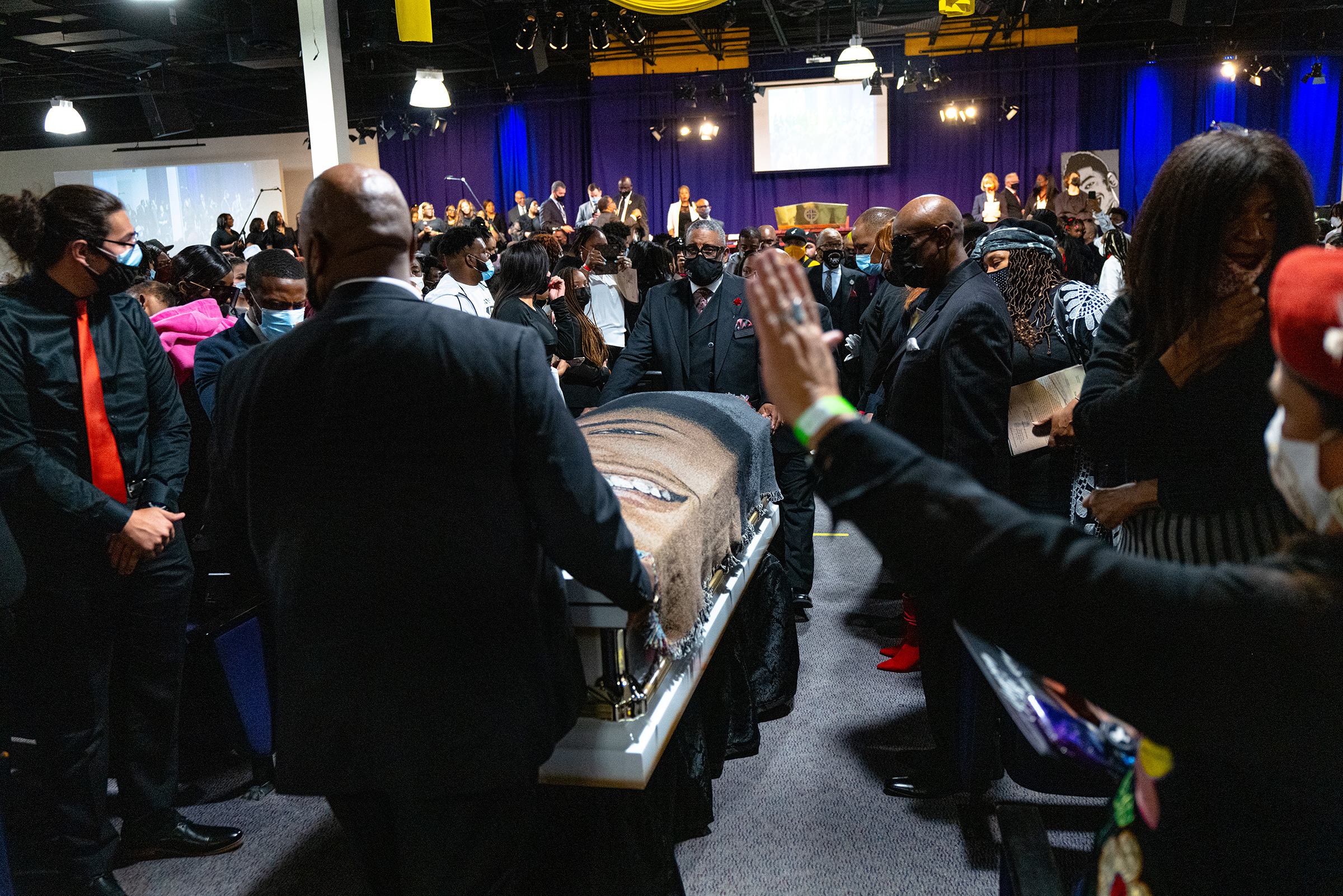
In the room, among the friends and family and neighbors of Wright, are relatives of Philando Castile, Jamar Clark, Oscar Grant, George Floyd and Emmett Till. They’ve been where the Wright family is now. Almost broken. Almost in total disbelief. After the trumpeter Keyon Harrold plays a rendition of “Amazing Grace,” cut with several stanzas of the National Negro Anthem, as artist Ange Hillz speed-paints a portrait of Wright, the mourners offer one of several brief standing ovations. It seems to ignite something in the room, something that is about Wright and not about Wright at all. The funeral takes on an intensely political quality.
When Crump speaks, it is of the need to fight for the lives of Black children and young people. They are precious, even if the world doesn’t always treat them that way.
We must fight till hell freezes over.
“We must fight till hell freezes over and then we have to fight on the ice,” Crump says, paraphrasing architect Vertner Woodson Tandy, who was himself paraphrasing a Confederate captain.
One has to say something when standing before the casket of a 20-year-old killed by a veteran white police officer who says she thought she was firing her Taser, not her gun.
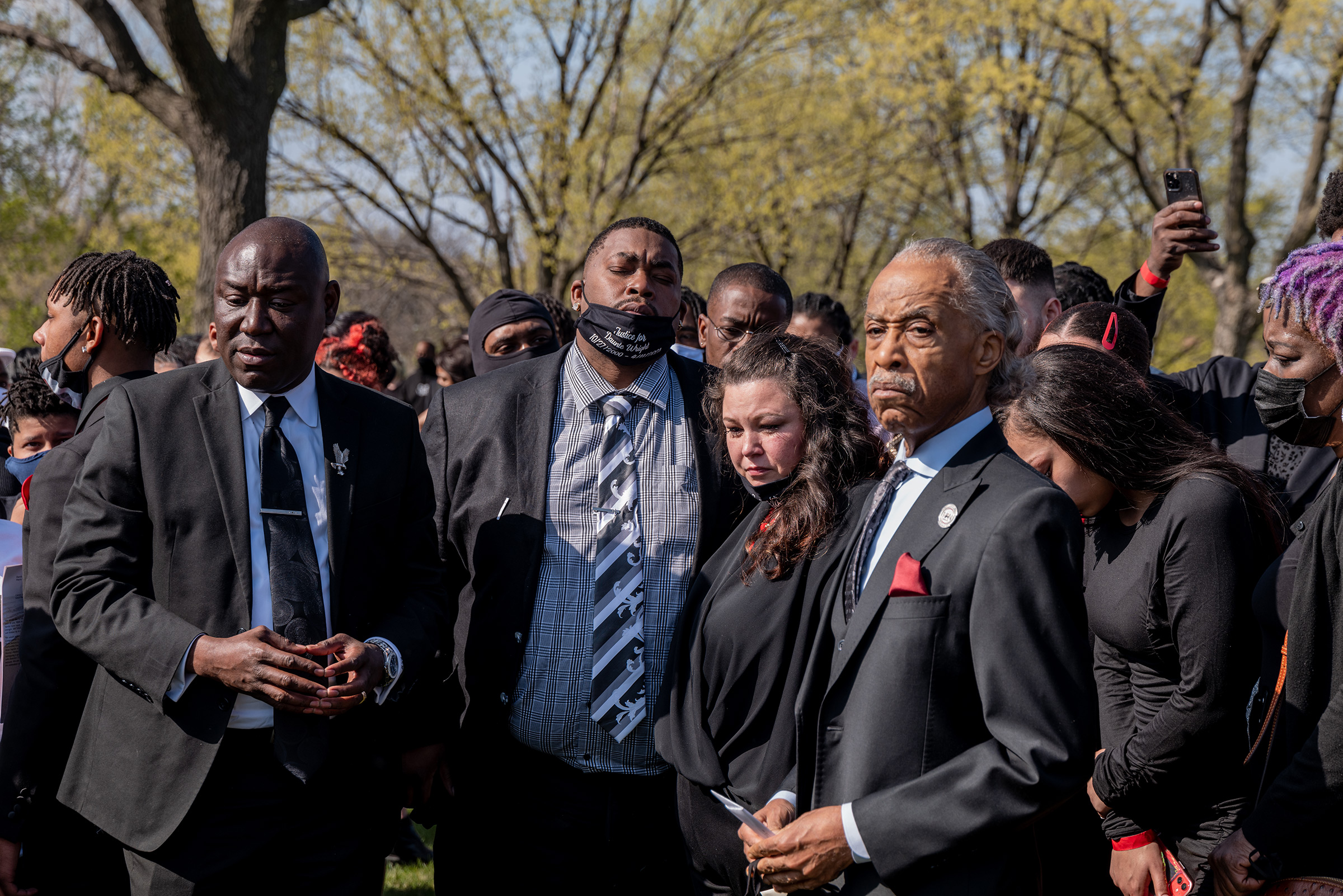
When the funeral, organized by Crump’s staff on behalf of an overwhelmed family, is over, the family files out to cars waiting at the curb for a drive to a local cemetery. There will be a ceremonial release of white doves and a gaggle of press so thick some friends can’t get close enough to see the birds emerge from their white basket. When the line of people requesting selfies with Crump inside the church has thinned, I ask him what is next for him.
“Elizabeth City, N.C.,” he says sighing. A family has called. “Another shooting. Another brother, dead. And the Sheriff won’t release the body-cam footage. So, we are going to go and see what we can do.”
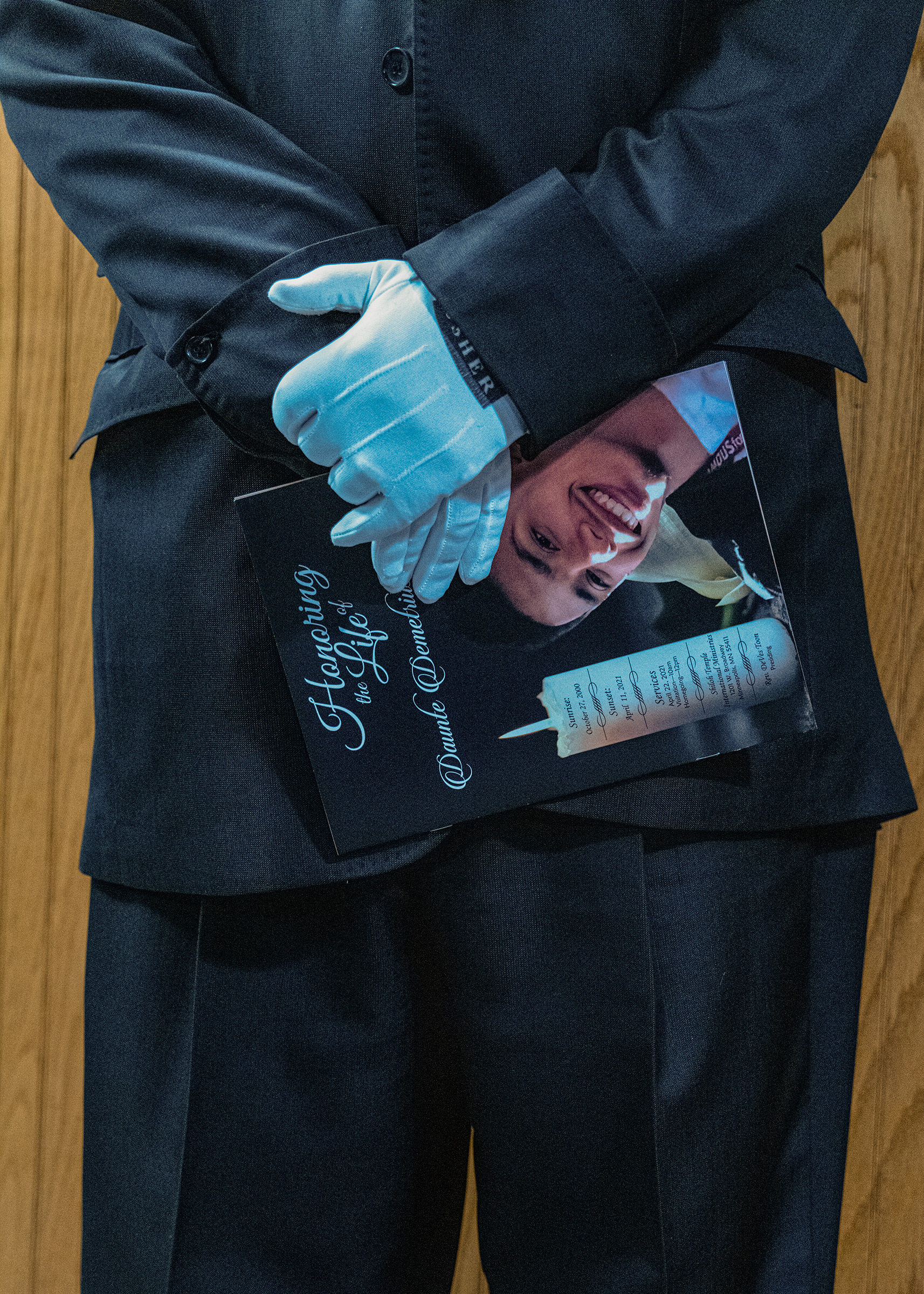
With reporting by Leslie Dickstein and Mariah Espada
More Must-Reads from TIME
- Cybersecurity Experts Are Sounding the Alarm on DOGE
- Meet the 2025 Women of the Year
- The Harsh Truth About Disability Inclusion
- Why Do More Young Adults Have Cancer?
- Colman Domingo Leads With Radical Love
- How to Get Better at Doing Things Alone
- Michelle Zauner Stares Down the Darkness
Contact us at letters@time.com
